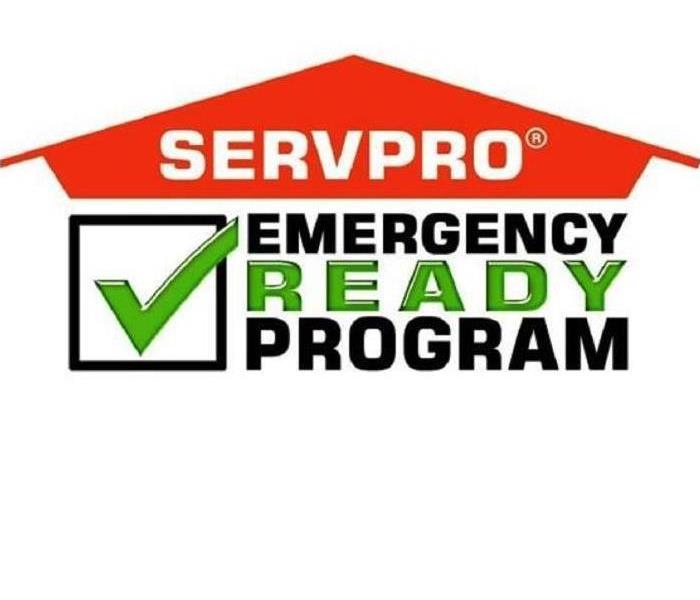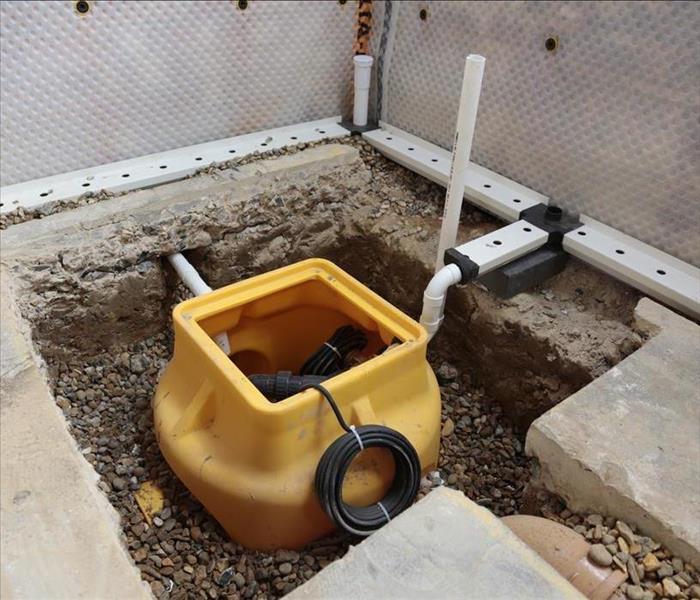Archived Commercial Blog Posts
Retail Flood Recovery: Back to Business In 5 Proven Steps
11/25/2024 (Permalink)
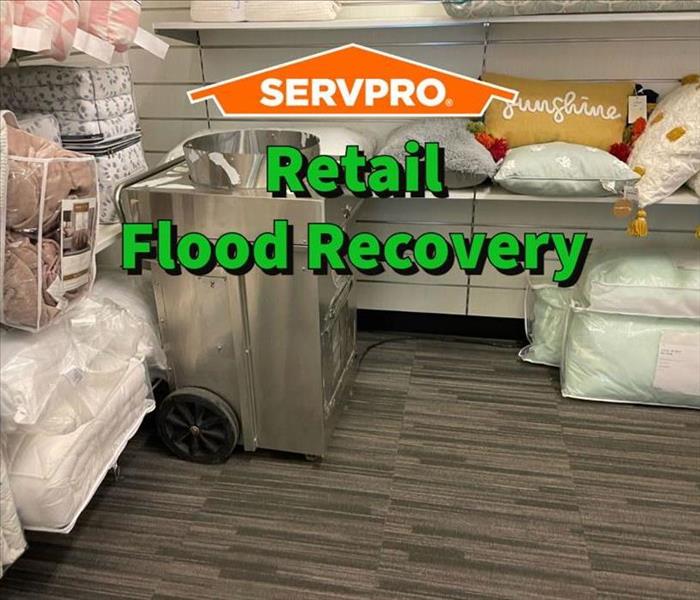 The professionals at SERVPRO are ready to help you combat water damage 24/7!
The professionals at SERVPRO are ready to help you combat water damage 24/7!
Flooding in retail spaces poses unique challenges. It threatens the property's structural integrity, disrupts operations, and potentially damages valuable inventory.
Flooding in retail spaces can be a nightmare, bringing operations to a grinding halt and jeopardizing valuable inventory. The good news? With the right recovery plan and professional assistance, you can minimize downtime and financial losses while restoring your retail space to its former glory.
In this comprehensive guide, we'll walk you through the proven steps of retail flood recovery, offer practical prevention tips, and show how SERVPRO® utilizes unmatched expertise that can make all the difference in getting your business back on track. If you're in Atlanta, Georgia—or anywhere else—this guide will equip you with the tools and knowledge to respond to property damage.
Why Retail Flood Recovery Requires Specialized Attention
Retail environments face distinct challenges in flood recovery. Beyond water extraction and structural drying, a comprehensive recovery must consider the following:
- Inventory protection and restoration.
- Maintaining customer and employee safety.
- Restoring the aesthetic appeal of the retail space.
- Rapid reopening to minimize revenue loss.
Ignoring even one of these factors can prolong downtime and have significant financial consequences.
5 Key Steps in Retail Flood Recovery
Recovering from a flood in a retail space involves a multi-faceted approach to ensure a safe and efficient restoration process. Here's a breakdown:
Step 1: Immediate Water Removal
Floodwaters can cause significant damage quickly. SERVPRO uses advanced water extraction equipment to remove standing water quickly, minimizing further impact on the building and inventory.
Step 2: Thorough Drying and Dehumidification
Hidden moisture in walls, floors, and fixtures can lead to long-term damage. SERVPRO ensures no moisture is left behind by using industrial-grade drying equipment and dehumidifiers.
Step 3: Inventory Assessment and Salvage
Retail inventory is often one of the most significant losses in a flood. Our team helps assess which items can be salvaged and employs techniques like freeze-drying for documents or specialized cleaning for electronics.
Step 4: Structural Repairs and Aesthetic Restoration
From repairing drywall to repainting and replacing flooring, SERVPRO ensures your retail space looks as good as new and is safe for reopening.
Step 5: Prevention of Future Flood Risks
Once recovery is complete, our professionals offer tailored advice on flood-proofing measures to reduce the risk of recurrence.
Practical Tips to Prevent Flood Damage in Retail Spaces
Taking proactive steps can significantly reduce the risk of flood damage. Here are actionable tips:
- Elevate critical equipment and inventory: Place electrical systems, valuable stock, and vital equipment on elevated platforms to avoid contact with floodwaters.
- Install flood barriers: Use flood barriers or sandbags to protect entrances and vulnerable areas during heavy rainfall or flood warnings.
- Regularly inspect drainage systems: Ensure your store's drains and gutters are debris-free to prevent water accumulation.
- Invest in waterproof storage: Store important documents, electronics, and other valuables in waterproof containers.
- Monitor weather alerts: Stay informed about local flood risks and act quickly to implement protective measures.
- Develop an emergency plan: Have a clear evacuation and recovery plan with contact information for emergency services and SERVPRO.
A Retail Flood Recovery Story in Atlanta, Georgia
Recently, a retail store in Atlanta, Georgia, experienced severe flooding after an unexpected storm overwhelmed the area's drainage systems. The shop, located in a bustling commercial district, faced water damage to its inventory, display fixtures, and storage areas. Recognizing the urgency of reopening quickly, the owner called SERVPRO for assistance.
SERVPRO's Response:
- Rapid Arrival and Assessment: Within hours of the call, our team arrived and conducted a thorough assessment of the damage, identifying areas of priority, such as the stockroom and main sales floor.
- Immediate Water Removal: Advanced extraction equipment was deployed to remove standing water quickly, allowing us to prevent further damage.
- Comprehensive Drying: Industrial-grade dehumidifiers and air movers were strategically placed to accelerate drying, especially in hidden areas like under display units and within walls.
- Inventory Recovery: Salvageable inventory was carefully cleaned and restored, and a detailed report regarding items deemed unsalvageable was provided for insurance purposes.
- Restoration and Reopening: The team repaired damaged drywall, repainted, and restored the flooring to its pre-damage condition, enabling the store to reopen just in time for a major sales event.
This case underscores how SERVPRO combines speed, expertise, and care to ensure businesses recover from flood damage as efficiently as possible.
Why Choose SERVPRO for Retail Flood Recovery?
When it comes to retail flood recovery, SERVPRO offers unmatched advantages:
- 24/7 Emergency Response: We're ready to assist anytime, minimizing downtime and preventing further damage.
- Advanced Technology: From powerful extraction tools to industrial drying equipment, we utilize the best tools in the industry.
- Expertise Across Industries: With experience handling commercial properties of all types, we understand the unique needs of retail spaces.
- Comprehensive Solutions: From water removal to complete restoration, we provide end-to-end services tailored to your situation.
Conclusion: Be Prepared for Retail Flood Recovery
Floods can strike retail spaces unexpectedly, causing disruptions that can be financially devastating. By understanding the steps to take during recovery and trusting experts like SERVPRO, you can mitigate damage and return to business faster.
Remember that preparation is critical for retail owners in Atlanta, Georgia, or anywhere else. Take proactive steps to flood-proof your property, and if disaster strikes know that SERVPRO is ready to help. Whether it's advanced water removal, inventory recovery, or complete restoration, our team is equipped to handle it all.
Choose SERVPRO for retail flood recovery and experience the difference of a trusted partner in restoration. Your property is in expert hands with us, ensuring you can focus on what matters most—your customers.
Office Flood Cleanup: Your #1 Guide to Efficient Restoration
6/24/2024 (Permalink)
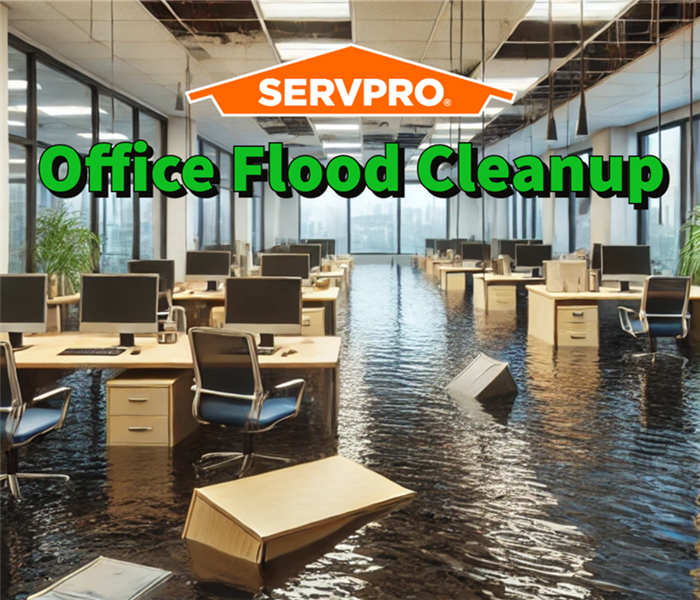 SERVPRO is ready to help combat a commercial water loss of any size!
SERVPRO is ready to help combat a commercial water loss of any size!
Expert insights and practical steps to safeguard your business from water-related damage.
Flooding in an office can be a significant disruption, causing extensive damage to property and interrupting business operations. Effective office flood cleanup minimizes damage and ensures a swift return to normalcy.
This blog post will explore the common causes of office flooding, offer practical cleanup tips, and showcase how SERVPRO® expertise can be invaluable in restoring commercial properties affected by water damage.
What are the common causes of office flooding?
Office flooding can result from a variety of sources. Understanding these causes can help in preventing and managing flood situations effectively:
- Burst Pipes: Aging or poorly maintained pipes can burst, leading to significant water leakage.
- Heavy Rainfall and Storms: Intense weather conditions can overwhelm drainage systems and cause water to seep into buildings.
- Faulty Appliances: Malfunctioning dishwashers, water heaters, and HVAC systems can leak and cause flooding.
- Clogged Drains: Blocked drains can cause water to back up and overflow, particularly in restrooms and kitchens.
- Sprinkler System Malfunctions: Accidental activation or faults in the sprinkler system can cause water damage.
How can office flooding lead to property damage?
The impact of office flooding can be severe and rapid. Common issues include:
- Structural Damage: Water can weaken walls, floors, and ceilings, compromising the structural integrity of the building.
- Damage to Equipment and Furniture: Computers, office furniture, and important documents can be destroyed by water.
- Electrical Hazards: Flooding can cause short circuits and other electrical hazards, posing a safety risk.
- Mold Growth: Prolonged moisture can lead to mold growth, further damaging property and requiring extensive remediation.
Tips for effective office flood cleanup
Cleaning up after an office flood requires a strategic approach and prompt action. Here are some practical steps to guide you through the process:
Stop the Source of Water
Identify and stop the source of the flooding if possible. This may involve turning off the water supply or addressing leaks from broken appliances.
Document the Damage
Take detailed photos and videos of the damage for insurance purposes. Document the extent of the water damage to equipment, furniture, and the building structure.
Remove Standing Water
Use pumps, wet vacuums, or mops to remove standing water. The quicker you remove the water, the less damage it will cause.
Dry and Dehumidify
After removing standing water, use dehumidifiers and fans to dry the affected area thoroughly. This step is crucial in preventing mold growth and further damage.
Clean and Disinfect
Clean and disinfect all surfaces that came into contact with the floodwater, including floors, walls, and furniture. Use professional-grade cleaning solutions to ensure thorough sanitation.
Dispose of Damaged Items
Properly dispose of items that cannot be salvaged, such as soaked carpets, damaged documents, and ruined furniture. This prevents the spread of contaminants and mold.
Check for Hidden Damage
Inspect hidden areas like behind walls, under floors, and ceilings for any signs of water damage. Use moisture meters and thermal imaging cameras to detect moisture that may not be visible.
Restore and Repair
Begin restoring and repairing the damaged areas. This may involve replacing drywall, flooring, and ceiling tiles and repairing structural damage.
Consult with Professionals
Hire a professional restoration company, like SERVPRO, to ensure a thorough and efficient cleanup. Professionals have the expertise and equipment to handle all aspects of flood restoration.
A recent office flood cleanup in Atlanta, Georgia
Last month, SERVPRO was called to handle a significant office flood cleanup project in Atlanta, Georgia. A commercial property integral to the local business community encountered a severe emergency: extensive water damage from a burst pipe. This situation highlights the importance of professional intervention in office flood cleanup.
Upon receiving the distress call, our SERVPRO team quickly mobilized to assess the situation. The action plan included:
- Immediate Water Extraction: We quickly addressed the standing water throughout the office using our advanced water extraction technology. This step was crucial in halting the spread of water and minimizing secondary damage.
- Thorough Drying and Dehumidification: Our focus shifted to comprehensive drying and dehumidification post-extraction. We deployed cutting-edge drying equipment and dehumidifiers, eradicating even the most concealed moisture. This phase is critical in mitigating the risk of mold and mildew, which can further damage the property.
- Detailed Damage Assessment: We conducted a thorough inspection to identify all areas affected by the water damage, including hidden moisture behind walls and under floors.
- Restoration and Repair: We performed necessary repairs to restore the structural integrity of the building, including replacing damaged drywall, flooring, and ceiling tiles.
- Safety and Compliance: Ensuring the safety of the building’s occupants was our top priority. We adhered to all safety protocols and compliance standards throughout the cleanup and restoration process.
This incident in Atlanta, Georgia, exemplifies the resilience and efficiency of our SERVPRO team. Faced with a familiar yet potentially devastating office flood scenario, our swift action and professional expertise salvaged the property and safeguarded it against future vulnerabilities. This case is a testament to our commitment to providing rapid, reliable, and comprehensive water damage restoration services, especially in critical business environments.
What should you do when you experience office flooding?
Immediate action is crucial in the event of office flooding. The first step is to stop the source of the water if possible. Then, quickly contacting a professional water restoration team is essential for mitigating the damage. While waiting for professional help, remove any wet items and attempt to dry the affected area. Extensive water damage requires professional equipment and expertise for thorough and safe restoration.
Wrapping up
SERVPRO’s reputation in office flood cleanup and water damage restoration is built on swift response, advanced technology, and skilled professionals. We understand the nuances of water damage restoration, particularly in critical office environments. Our team is trained to handle complex scenarios, ensuring efficient and effective restoration. With SERVPRO, business owners receive comprehensive restoration services tailored to their needs.
Choosing SERVPRO for office flood cleanup offers more than just repair services; it provides property protection partnerships. Our quick response, cutting-edge techniques, and customer-centric approach make us a trusted ally in navigating the challenges of office flooding. As we have seen, office flooding can strike unexpectedly. Still, with preparation and the support of SERVPRO professionals, your business can emerge unscathed from the most challenging water damage incidents.
By following these tips and relying on professional expertise, you can effectively manage and prevent office flooding, ensuring your property remains safe and secure. Whether dealing with a minor leak or a significant flood, SERVPRO is here to help with comprehensive office flood cleanup and restoration services.
Retail Store Water Damage: 7 Benefits of Professional Help
1/29/2024 (Permalink)
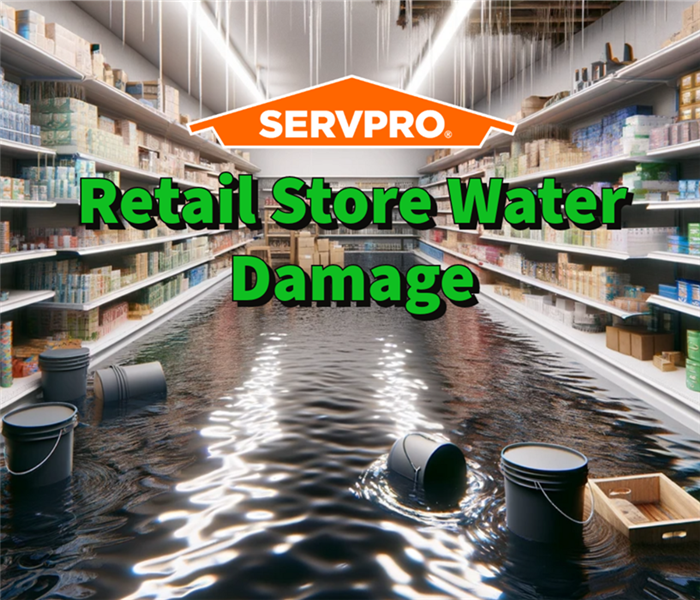 The professionals at SERVPRO are available 24/7 to help combat retail store water damage!
The professionals at SERVPRO are available 24/7 to help combat retail store water damage!
When you find yourself facing retail store water damage, give SERVPRO® a call right away to get back in business!
Welcome to the SERVPRO platform of property wisdom, where we delve into the intricacies of restoration. In this comprehensive guide, we address a critical topic that can profoundly impact retail businesses—water damage. Join us as we explore the seven compelling reasons why enlisting the expertise of SERVPRO's professionals is essential when your retail store faces the daunting challenge of water damage. Discover the benefits through a scenario in Atlanta, where our SERVPRO team swiftly and effectively restored a water-damaged retail store to its former glory.
What is considered significant retail store water damage?
Significant water damage in a retail store encompasses a range of scenarios, from burst pipes and roof leaks to flooding and plumbing mishaps. In Atlanta, a retail store recently faced a severe water damage crisis due to a burst pipe that flooded the premises. The situation was dire, with inventory at risk and structural damage apparent.
When should I worry about retail store water damage?
Worrying about retail store water damage should begin the moment you notice any signs of water intrusion, no matter how minor they may seem. In Atlanta, the retail store owner acted quickly when they discovered water pooling on the shop floor. Their quick thinking and immediate call to SERVPRO made all the difference in preventing further damage.
Swift response is key
One of the primary benefits of choosing SERVPRO for retail store water damage is our rapid response. In the Atlanta scenario, our team arrived promptly to assess the situation. This quick action prevented the water damage from spreading further, mitigating potential long-term issues.
Expert assessment and mitigation
Our experts thoroughly assessed the extent of the water damage in the Atlanta retail store. This step is crucial in determining the most effective mitigation strategies. From there, we employed specialized equipment and techniques to extract water, dry the affected areas, and salvage as much inventory as possible.
minimizing business downtime
Downtime can be a significant concern for retail businesses facing water damage. SERVPRO's efficient restoration process in Atlanta minimizes business disruption, allowing the store to reopen its doors to customers sooner than expected.
Preventing mold and secondary damage
Water damage often leads to mold growth if not addressed promptly and correctly. In the Atlanta case, our SERVPRO team's meticulous approach ensured thorough drying and dehumidification, preventing mold issues and secondary damage to the structure.
Comprehensive restoration
Choosing SERVPRO for retail store water damage means opting for a comprehensive restoration team. Beyond water removal and drying, we also repair and reconstruct as needed. In Atlanta, we eliminated the water damage and restored the retail store to its pre-damage condition, saving the owner time and hassle.
Scenario in Atlanta, Georgia:
In the streets of Atlanta, a retail store found itself in the throes of a water damage nightmare. A burst pipe unleashed a deluge that threatened inventory, fixtures, and the store's structural integrity. The store owner's immediate response was to reach out to SERVPRO for assistance. Our team, well-versed in swift action, arrived promptly at the scene. With a keen eye for expert assessment, we determined the extent of the water damage and devised a strategic mitigation plan.
We swiftly extracted the water and initiated the drying process using cutting-edge equipment and techniques. Our meticulous approach ensured that the inventory, fixtures, and structural components were all carefully assessed for damage. Through efficient mitigation, we prevented further harm and significantly reduced the risk of long-term issues such as mold growth and structural decay.
One of the critical advantages of choosing SERVPRO became evident as we minimized business downtime. We understood the pressing need for the retail store to resume its operations promptly. Our efficient restoration process allowed the store to reopen its doors to customers sooner than anticipated, ensuring minimal disruption to their business.
Our commitment to a comprehensive restoration was further exemplified as we removed the water damage and took on the task of repairing and reconstructing affected areas. The retail store owner was relieved to find that SERVPRO's expertise extended beyond water removal, encompassing the complete restoration of their establishment.
Choose SERVPRO as your retail store water damage experts
When water damage strikes your retail store, the choice is clear – SERVPRO's experts are your trusted partners in recovery. Our rapid response, expert assessment, and mitigation, coupled with our ability to minimize downtime and prevent secondary damage, make us the ideal choice for restoring your retail business. Don't let water damage disrupt your operations and bottom line. Choose SERVPRO, where excellence in retail store water damage restoration is a commitment we uphold to ensure your business's uninterrupted success. Trust us to handle the challenges while you focus on what you do best – serving your customers and growing your retail business. Our track record speaks for itself – when it comes to water damage, SERVPRO stands as the epitome of efficiency and expertise, ready to restore your retail store to its full glory
Restaurant Fire Damage: 5 Insights to Defend Your Investment
8/28/2023 (Permalink)
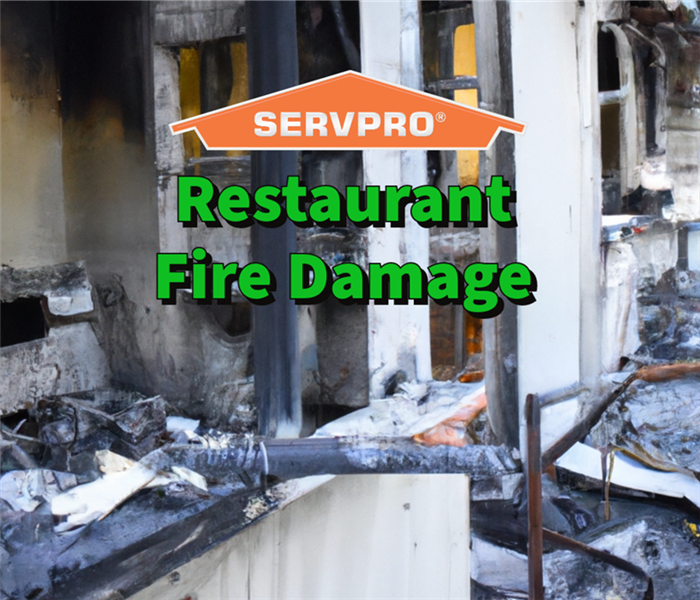 Navigate restaurant fire damage with SERVPRO!
Navigate restaurant fire damage with SERVPRO!
Recover from restaurant fire damage with the proper professional help.
Restaurants stand as a cornerstone of our communities, but these vibrant establishments are not exempt from the lurking threat of fire damage. Restaurant fire damage can be catastrophic, wreaking havoc on property, reputation, and livelihoods. In this blog post, we will explore the common causes of restaurant fire damage, recount a recent scenario involving a SERVPRO® intervention in Atlanta, and highlight why hiring SERVPRO for commercial fire restoration services is the wisest choice.
What are common signs of restaurant fire damage?
Recognizing the signs of fire and smoke damage is paramount for timely intervention. Charred walls, discolored ceilings, and pervasive smoke odors are telltale signs of a past restaurant fire. These indicators often hint at potential underlying structural damage that requires professional attention.
What are the leading causes of restaurant fires?
Restaurant fires frequently emerge from a cluster of culprits, each capable of transforming a culinary haven into a fiery nightmare. Grease buildup in exhaust systems, faulty wiring, kitchen appliances malfunctioning, and human error during cooking procedures are some of the leading causes. Addressing these potential hazards can significantly reduce the risk of fire outbreaks.
Tips to prevent restaurant fire damage
Prevention is the first line of defense against the destructive potential of restaurant fires. Regular maintenance of kitchen equipment, grease trap cleaning, proper storage of flammable materials, and consistent staff training on fire safety protocols are essential to mitigating fire risks. Educating restaurant employees about fire safety and equipping them with fire extinguisher usage knowledge can be instrumental in averting disasters.
A recent Atlanta restaurant fire
Earlier this year, a popular eatery in the heart of Atlanta fell victim to a devastating fire. The establishment, beloved by locals for its delectable offerings, faced an unexpected crisis: a grease fire erupted in the kitchen due to a neglected exhaust system, swiftly engulfing the premises in flames. Panicked patrons were evacuated, and the fire department was summoned to douse the flames. However, the restaurant was left ruined in the fire's aftermath, its interiors marred by soot, smoke, and water damage.
In the wake of this catastrophe, the establishment's owner turned to SERVPRO, a renowned name in fire damage restoration. The skilled team from SERVPRO swiftly arrived at the scene, meticulously assessing the extent of the damage. Armed with advanced equipment and years of expertise, they embarked on a comprehensive restoration process.
Why choose SERVPRO for commercial fire restoration?
- Rapid response and comprehensive assessment: Time is of the essence when dealing with fire damage. SERVPRO's prompt response ensures that damage is contained and restoration efforts can commence swiftly. Our thorough assessment identifies hidden damage, laying the foundation for a comprehensive restoration plan.
- Expertise and cutting-edge technology: Commercial fire restoration demands a blend of knowledge and innovative technology. SERVPRO's team is trained in the latest techniques and equipped with state-of-the-art tools, enabling us to tackle even the most intricate restoration challenges.
- Tailored restoration plans: Every fire damage scenario is unique, requiring a tailored approach. SERVPRO crafts individualized restoration plans that address the specific needs of each establishment. Our solutions are designed to resurrect restaurants—from odor removal to structural repairs—restoring them to their former glory.
- Soot and smoke damage eradication: Soot and smoke damage can be pervasive, affecting visible surfaces and lurking within crevices. SERVPRO's advanced cleaning methods eliminate these stubborn residues, restoring interiors to their pre-fire condition.
- Efficient water damage restoration: Firefighting efforts often leave establishments soaked. SERVPRO excels in fire damage and water damage restoration, ensuring that the effects of firefighting efforts are mitigated without delay.
Wrapping up
Restaurant fire damage is an ever-present threat that can disrupt businesses, tarnish reputations, and shatter dreams. Recognizing the signs of damage, understanding the causes, and implementing preventive measures are crucial in safeguarding culinary establishments.
However, should disaster strike, the case of the Atlanta restaurant serves as a testament to SERVPRO's prowess in fire damage restoration. Our swift response, expertise, and commitment to tailored solutions make us the ultimate choice for navigating the treacherous waters of commercial fire restoration. Choosing SERVPRO ensures that the phoenix of your restaurant rises from the ashes, stronger and more resilient than ever before.
Hotel Room Mold: The Top 5 Reasons For Mold Growth
3/27/2023 (Permalink)
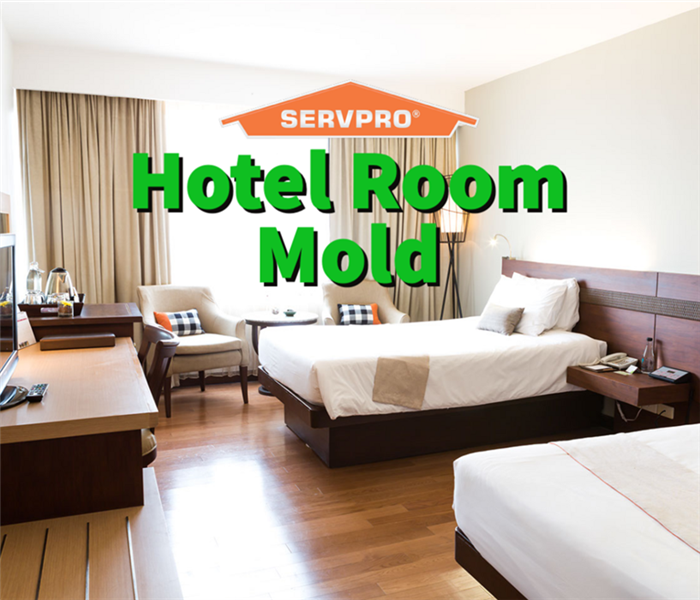 The professionals offer the highest quality mold remediation services!
The professionals offer the highest quality mold remediation services!
Hotel room mold can have negative impacts, destroy the aesthetic of your accommodations and reduce the value of your stay.
Nothing is worse after a long day of travel than finding mold in your hotel room. Hotel room mold is a real problem that can cause various issues, and it may appear in the form of dampness, discoloration, and musty odors.
Although some hotels may offer solutions, the best way to avoid staying in an uncomfortable room with mold is by asking for another room.
The professionals at SERVPRO of Downtown Atlanta know that hotel room mold is never something to take lightly. The following blog post will cover the top five reasons your hotel room may be moldy. We will then conclude with a few steps to follow after finding mold in your room. So read on to learn more about identifying signs of hotel room mold and keeping yourself safe from this potential health risks!
What are the signs of hotel room mold?
One of the most common signs of hotel room mold is dampness. Hotel rooms that are not adequately ventilated may develop high moisture levels, leading to black or green patches on walls, ceilings, and other surfaces. Additionally, discoloration on walls and floors can indicate a mold problem. Finally, another telltale sign of hotel room mold is a musty odor that lingers.
What are the top 5 reasons why your hotel room is moldy?
The following list includes the top five reasons that you may encounter mold in your hotel room:
- Poor ventilation: Hotel rooms with improper ventilation can cause high moisture levels, leading to harmful mold growth.
- Leaky pipes: Hotel pipes that regularly leak can add further moisture and lead to mold development.
- Poorly restored water damage: Hotel rooms that have suffered water damage—such as a flooded bathroom or roof leak—can experience mold growth due to the ineffective removal of dampness and excess moisture.
- Improper cleaning: Hotel rooms that need to be thoroughly cleaned can also grow mold due to dirt and dust particles accumulating in corners and other dark, moist places.
- High humidity: Hotel rooms with high humidity levels can cause mold issues due to the higher moisture levels in the air.
Steps to follow after finding hotel room mold
Now that you know the top five reasons why your hotel room is moldy, it’s time to discuss what steps to take after finding mold in your hotel room. Before we begin: the experts at SERVPRO of Downtown Atlanta recommend taking immediate action if you notice any signs of mold or a musty odor.
First and foremost, immediately contact the hotel staff to inform them of the mold issue. Once you’ve alerted the hotel staff, keeping a record of the conversation and documenting any evidence is essential.
Next, hotel staff should inspect the room for any visible signs of water damage or excess moisture—they may need to call a professional mold remediation company to assess the situation if necessary.
The next step is to ask to move to a different room, on a different floor, because if you have found mold in your room, chances are other rooms on the same floor have been affected too.
Finally, if the hotel refuses to move you or cannot provide a satisfactory solution to the mold issue, ask for a refund or compensation.
By following these steps, you can ensure that your experience at a hotel is as pleasant and mold-free as possible. Remember, hotel room mold can be dangerous, so taking the appropriate steps to protect yourself and your family from potential risks is essential.
SERVPRO of Downtown Atlanta remediates hotel room mold
The professionals at SERVPRO of Downtown Atlanta understand how to adequately address hotel room mold issues. Our team has the experience and knowledge to safely remediate your hotel’s mold problem, giving you peace of mind that it is handled promptly and efficiently.
We use state-of-the-art equipment and techniques to locate, identify, and remove mold from hotel rooms and prevent future growth. We also take the proper precautions to ensure our customers are not exposed to risks.
Contact SERVPRO of Downtown Atlanta today if you suspect that your hotel room may be affected by mold or a musty odor. Our team is here to help and will work with you to ensure your hotel stays mold-free.
Preventing Restaurant Water Damage With 5 Simple Tips
10/24/2022 (Permalink)
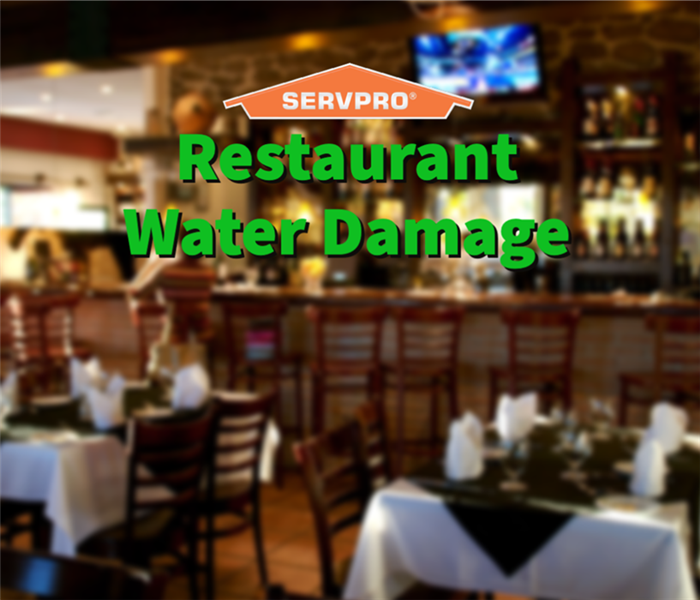 The professionals at SERVPRO are on call to help you when your restaurant has water damage!
The professionals at SERVPRO are on call to help you when your restaurant has water damage!
Water damage in a restaurant can be a significant problem—it can cause structural damage and lead to mold growth.
Restaurants are susceptible to water damage for many reasons. A broken pipe, a faulty dishwasher, or a roof leak can all cause water damage. The best way to prevent restaurant water damage is by being proactive and knowing what to look out for before water damage happens in the first place.
The professionals at SERVPRO of Downtown Atlanta want to help ensure your restaurant is protected from water damage, so we've put together this list of five tips for preventing restaurant water damage:
- Install a water detection system
- Check for plumbing leaks
- Inspect appliances regularly
- Maintain clean gutters
- Frequently inspect the roof
In this blog post, we will go over these tips in more detail and describe what you can do when your property faces restaurant water damage.
What does restaurant water damage look like?
Water damage can wreak havoc on a restaurant’s day-to-day operations. Not only can it cause structural damage, but it can also lead to the growth of mold and bacteria. Water damage can also lead to loss of business if the restaurant closes for repairs.
Restaurants are particularly susceptible to water damage because of their layout and the many appliances and equipment they contain. For example, a broken pipe, a faulty dishwasher, or a roof leak can quickly cause water damage.
Some common signs of restaurant water damage include:
- Water spots on the ceiling
- Standing water on the floor
- Excess moisture on the walls
- Warped baseboards of walls
- Soft drywall
- A damp, musty smell
If you see any of these signs, call the experts immediately. With our advanced moisture detection technology, we can find the source of the water and ensure the excess moisture doesn’t affect your operations!
Preventing restaurant water damage
The professionals at SERVPRO of Downtown Atlanta want to help protect your restaurant from water damage. Here is a list of five tips we put together for preventing restaurant water damage:
- Install a water alarm. A water alarm is a device that will alert you when it detects moisture or water infiltration. A water alarm can help you quickly identify and address potential water leaks. These crucial devices have proved instrumental in preventing restaurant closures due to water infiltration.
- Check for plumbing leaks. Since plumbing leaks are one of a restaurant's most common causes of water damage, check your pipes regularly for signs of leakage.
- Inspect appliances regularly. Appliances such as dishwashers and refrigerators can sometimes leak water, leading to severe water damage. Make sure to inspect these appliances regularly for signs of cracks or degradation.
- Maintain gutters and drains. Clogged gutters and drains can cause water to back up and overflow, leading to water damage indoors. Make sure to keep your gutters and drains clear so water can flow freely.
- Inspect the roof regularly. A faulty roof can allow water to seep into the building, leading to severe water damage. Have your roof inspected twice a year at a minimum for any signs of wear or leaks.
These five tips can help reduce the risk of water damage in your restaurant!
SERVPRO of Downtown Atlanta can help combat restaurant water damage
Before restaurant water damage occurs, we recommend you have a contingency plan for water emergencies and train your staff on proper procedures in case of a flood or other water damage situation.
Act quickly to mitigate the damage when your restaurant suffers from water damage; the faster you act, the less damage your restaurant will suffer. SERVPRO of Downtown Atlanta is a water damage restoration company that specializes in helping restaurants recover from water damage. We have the training, experience, and equipment necessary to restore your restaurant to its pre-damaged state.
We understand restaurants' unique challenges regarding water damage, and we are here to help. Contact us today to learn more about our water damage restoration services.
5 Apartment Water Damage Prevention Tips For Property Managers
8/3/2022 (Permalink)
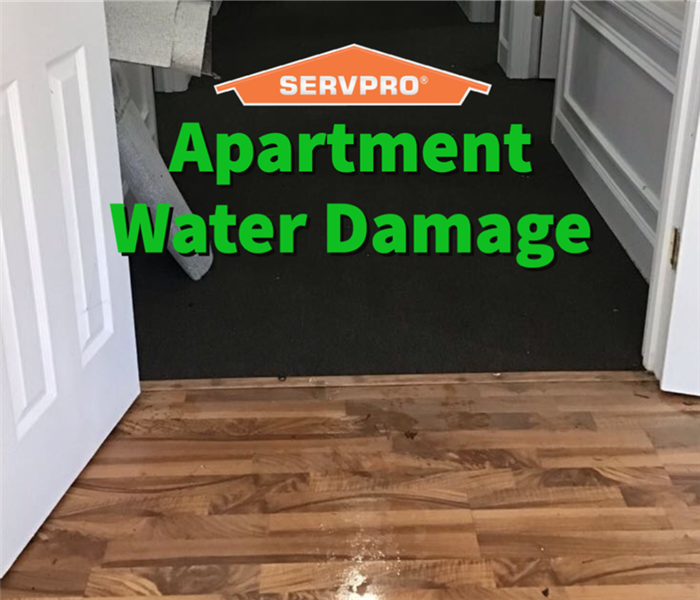 The professionals at SERVPRO are here to help combat apartment water damage!
The professionals at SERVPRO are here to help combat apartment water damage!
Recover from apartment water damage quickly with help from SERVPRO of Downtown Atlanta!
Property managers have a lot on their plate. Between overseeing repairs, dealing with tenants, and handling finances, it's no wonder that some things can slip through the cracks. Unfortunately, one of those things that can often go overlooked is water damage prevention.
Water damage prevention can help save you time and money in the long run, and it's something that every property manager should take seriously. This blog post will give you five tips for preventing water damage in your apartment complex. Water damage can be a massive headache for property managers, costing time and money in repairs and disrupting tenants' lives. Keep reading to learn more!
What is apartment water damage?
Apartment water damage is any water damage that occurs in an apartment complex. We have witnessed water damage in apartment complexes come from a variety of sources, including:
- Leaky pipes
- Flat roof leaks
- Clogged drainage systems
- Broken or malfunctioning appliances
- Heavy rains or flooding
Apartment water damage often causes extensive damage, leading to costly repairs and disrupted lives. Therefore, property managers must be aware of the signs of apartment water damage to take corrective action before it becomes a bigger problem. Some common indicators of water damage include:
- Wet spots on walls or ceilings
- Sticky surfaces
- Mold or mildew growth
- A musty odor
- Water dripping or seeping from walls or ceilings.
Five tips to prevent apartment water damage
The professionals at SERVPRO of Downtown Atlanta have seen firsthand the devastation apartment water damage can cause. That's why we're sharing our top five tips for preventing apartment water damage in your complex:
- Check pipes regularly for leaks.
- Inspect roofs and gutters regularly for leaks or clogs
- Educate tenants on the importance of water damage prevention
- Regularly inspect appliances for leaks or damage.
- Test your sump pump to ensure it's working properly
What to do if you experience apartment water damage
When an apartment complex experiences water damage, it's important to act quickly to minimize the damage. Here are essential steps to follow when you experience apartment water damage:
- Call a professional: First and foremost, it's essential to call a professional water damage restoration company with the training and equipment to quickly and efficiently clean up water damage.
- Turn off the water source: If you can identify the water source, be sure to turn it off. Turning off the water source will help prevent further damage.
- Remove wet items: Once the water has been turned off, remove any wet items from the apartment, including carpeting, furniture, and electronics.
- Begin drying the area: Use fans and dehumidifiers to dry the apartment as quickly as possible. Drying out the area will help prevent mold and mildew growth.
Apartment water damage doesn't have to be a headache. Following these tips can help prevent apartment water damage in your complex.
SERVPRO of Downtown Atlanta: water damage restoration experts!
We hope you found this blog post helpful. We understand that property managers have a lot on their plate, and we're here to help! If your apartment complex has experienced water damage, don't hesitate to call the experts at SERVPRO of Downtown Atlanta. We are experts in commercial water damage and will work quickly to restore your apartment complex back to its original condition.
When you choose to hire us, we will:
- Extract the water from your apartment complex
- Dry out your apartment complex
- Repair any damage caused by the water
- Restore your apartment complex to its original condition
Apartment water damage can be challenging to navigate. That's why we're here to help, 24 hours a day, seven days a week. Contact us today!
The Top 5 Causes of Hospital Water Damage
5/18/2022 (Permalink)
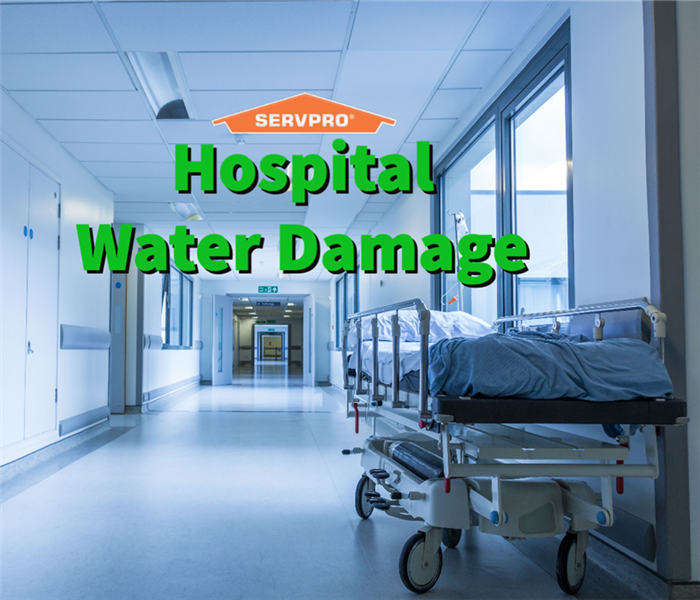 Contact the professionals at SERVPRO when your hospital suffers from water damage!
Contact the professionals at SERVPRO when your hospital suffers from water damage!
Water damage in hospitals can have a disastrous effect on patients, staff, and equipment.
When most people think of water damage, they imagine a flooded house. However, water damage can also occur in many different commercial settings. For example, in 2019, water damage affected Grady Memorial Hospital in Atlanta, Georgia, after a pipe burst.
The professionals at SERVPRO of Downtown Atlanta understand that hospitals are especially vulnerable to water damage because they have many different potential sources of water leaks.
The following blog post will explore the top 5 causes of water damage in hospitals so that you can be aware of the potential risks and take steps to prevent them.
What is hospital water damage?
Hospital water damage is any physical damage caused by water or moisture to hospital property, including but not limited to:
- Buildings
- Equipment
- Supplies
- Records
As you can see, hospital water damage can cause a hospital to lose a lot more than just revenue.
The top 5 causes of water damage in hospitals
The hospital water damage process can be very complicated because there are many different potential sources of hospital water damage, and each source has its own unique set of risks and consequences. Let's take a look at the top 5 causes of hospital water damage:
1. Faulty plumbing
One of the most common causes of hospital water damage is faulty plumbing. Faulty plumbing can include leaks in pipes, toilets, and faucets.
2. Spills
Another common cause of hospital water damage is accidental spills. Cleaning supplies, beverage containers, and equipment can all cause potential spills.
3. Foundation leaks
Another potential cause of hospital water damage is foundation leaks. These leaks can occur when there is a problem with the hospital's foundation, such as cracks or gaps.
4. Floods
Floods are another common cause of hospital water damage. This type of water damage can occur when there is a heavy rainstorm or a natural disaster.
5. Water leaks from roofs and windows
Another potential source of hospital water damage is water leaks from roofs and windows. These leaks can occur due to various factors, such as poor maintenance, damaged seals, or faulty construction.
Preventing hospital water damage
Now that you are familiar with the top 5 causes of hospital water damage, let's take a look at some prevention steps you can take:
- Regularly check for leaks and repair them as soon as possible. By checking for leaks on a regular basis, you can prevent hospital water damage before it has a chance to occur.
- Clean up spills immediately to prevent hospital water damage.
- Periodically check the hospital's foundation for any signs of leaks and fix them as quickly as possible.
- Make sure your hospital has an emergency plan in place in case of a flood or other natural disaster. This plan should include steps for evacuating patients and staff and protecting equipment and supplies.
- Regularly inspect roofs and windows for any signs of leaks and repair them as soon as possible. We suggest checking the seals around doors and windows on a monthly basis.
You can help prevent water damage and keep your hospital running smoothly by taking these steps.
Why choose SERVPRO for hospital water damage restoration
If you are looking for a commercial water damage restoration company that you can trust, look no further than SERVPRO of Downtown Atlanta. We are a locally owned and operated company with over 20 years of experience in commercial water damage restoration. We understand the unique challenges hospitals face regarding water damage, and we are here to help.
We are a team of IICRC-certified water damage restoration technicians available 24/7 to help you with your hospital water damage needs. Contact us today to learn more about our hospital water damage services or to schedule an estimate.
Warehouse Mold: 5 Ways Mold Can Be Destructive
4/20/2022 (Permalink)
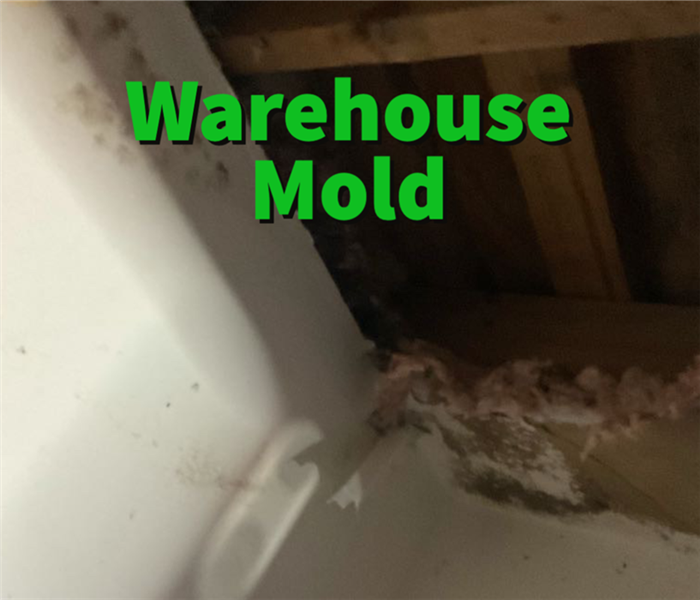 Contact the professionals at SERVPRO for commercial mold removal services!
Contact the professionals at SERVPRO for commercial mold removal services!
Mold can be a severe problem for warehouses, as it can cause significant damage to the business.
The professionals at SERVPRO of Downtown Atlanta know how important it is for a warehouse to stay free of mold because mold can be highly disruptive to any workplace.
The following blog post will explore five ways warehouse mold can specifically hurt your warehouse and your business's bottom line. By the end of this blog post, you will understand what mold is and the potential harm it can cause in a warehouse setting. You will also know some effective prevention measures to reduce the risk of infestation. So without further ado, let's get started!
What is mold?
Mold is a type of fungi found both indoors and outdoors. There are many different types of mold, and they can come in a wide variety of colors but will often appear as a green or blackish substance on surfaces.
Mold can easily make its way into a warehouse through doors, windows, or cracks in the foundation. Once mold has taken hold, it can spread quickly through the building by releasing spores into the air.
How is warehouse mold destructive?
There are several ways in which mold can be destructive to revenue:
- Warehouse mold can contaminate food. For example, if mold grows on food stored in your warehouse, it can make the food unsafe to eat.
- Warehouse mold can damage the structure of your warehouse. If left unchecked, mold can cause severe damage to your warehouse's walls, ceilings, and floors. Structural damages can make your property unsafe and challenging to use, leading to lost revenue.
- Warehouse mold can leave a nasty smell throughout the property. Musty odors can make your warehouse less attractive to customers and more difficult to lease or sell.
- Warehouse mold can damage your reputation. If customers become aware that mold is present in your warehouse, they may be less likely to do business with you.
- Warehouse mold can lead to insurance problems. If your insurance policy covers mold damage, your premiums may increase. Also, in some cases, insurers may refuse to cover mold damage due to neglect.
5 Warehouse mold prevention tips
Taking steps to prevent mold from growing in your warehouse is essential to protecting your business. Some effective mold prevention measures include:
- Keep the warehouse clean and free of debris.
- Maintain good ventilation to reduce humidity levels.
- inspect the property regularly for signs of mold growth.
- Repair any leaks or other sources of water immediately.
- Use dehumidifiers to control humidity levels.
If you find mold growing in your warehouse, it is essential to deal with the problem immediately. You should remove any affected materials and clean the affected area thoroughly. If the mold problem is severe, you may need a professional to remove it safely.
Who to hire for warehouse mold removal?
It is essential to hire an experienced and qualified professional when it comes to mold removal. The professionals at SERVPRO of Downtown Atlanta have the training, experience, and equipment necessary to safely and effectively remove mold from your warehouse.
Wrapping up
We hope you found this blog post helpful. As you learned, mold can cause many problems for warehouses and the businesses that operate within them. If you suspect that your warehouse has a mold problem, it is essential to act quickly and contact SERVPRO of Downtown Atlanta.
The professionals at SERVPRO of Downtown Atlanta have the training, experience, and equipment necessary to safely and effectively remove mold from your warehouse. SERVPRO professionals will also work with you to ensure that the mold does not return.
Don't hesitate to contact us if you need assistance with commercial mold removal or any other restoration services. We are here to help!
5 Amazing Steps to Take After Finding Water in Your Elevator Pit
3/30/2022 (Permalink)
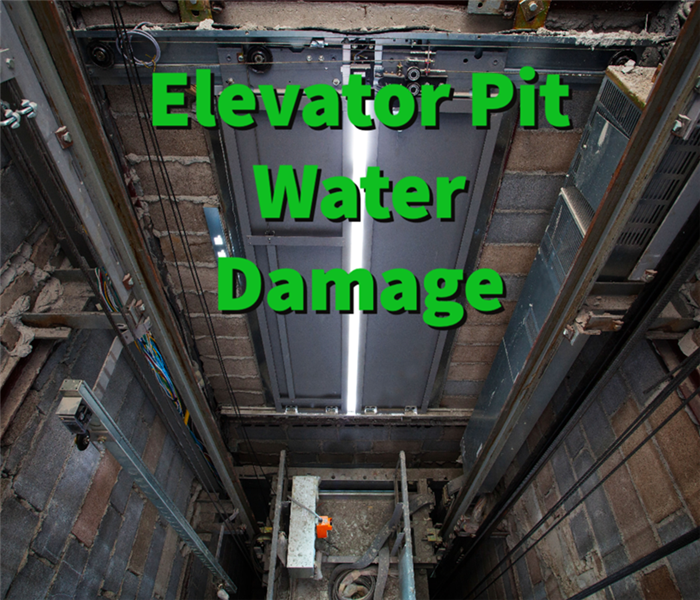 Contact the professionals at SERVPRO after your find water in your elevator pit!
Contact the professionals at SERVPRO after your find water in your elevator pit!
Water in your elevator pit can cause all sorts of problems. Not only is it a safety hazard, but it can also damage the equipment and slow down service.
After finding water in your elevator pit, it is essential to take the necessary steps to mitigate any damage that has occurred to your property. Elevator pits can often be challenging to dry out, so it is vital to act quickly and calmly.
The professionals at SERVPRO know that finding water in your elevator pit is never a good thing. In fact, it can be downright dangerous. If you ever find water in your elevator pit, it's essential to take the following five steps:
- Shut down the elevator immediately
- Call your elevator service company
- Locate the source of the water damage
- Clean up the water and restore the area
- Install a sump pump
The following blog post will provide more information on elevator water damage as well as reasons to contact the professionals at SERVPRO of Downtown Atlanta for commercial water damage services.
The causes of water in an elevator pit
Several things can often cause water in an elevator pit. Some of the most common causes of water in an elevator pit are:
- Clogged drains
- Faulty water pumps
- Water seepage from the roof or walls
- Improper maintenance
If you are experiencing water in your elevator pit, it is crucial to find the source of the water and take steps to fix it. Failing to do so can cause even more damage and create a bigger headache down the road.
How to clean up water in an elevator pit
Cleaning up water in an elevator pit can be difficult, but getting the water out as quickly as possible is essential. When there is a significant amount of water, it is best to call in a professional water restoration company.
SERVPRO of Downtown Atlanta is a water restoration company that can help you clean up water in your elevator pit.
Preventing water in an elevator pit
There are a few things that you can do to prevent water from getting into your elevator pit in the first place. Some of the best ways to prevent water damage are:
- Install a sump pump
- Maintain your drains and water pumps
- Ensure the roof and walls are watertight
- Apply watertight sealant on the elevator pit floor
By following these prevention tips, you can help to prevent water from getting into your elevator pit and causing damage.
Wrapping up
We hope this blog post has been helpful. If you ever find water in your elevator pit, it is essential to take the necessary steps to mitigate any damage that has been done. Elevator pits can often be challenging to dry out, so it is crucial to act quickly with professional help.
Remember, it is essential to ensure that water does not come into contact with electrical equipment or any other combustible material. If water has spilled onto an electrical device, turn it off and unplug it immediately. It is also best to keep all patrons away from water-soaked areas as well.
In the case that you find water in your elevator pit, remember to call SERVPRO of Downtown Atlanta for water restoration services.
SERVPRO of Downtown Atlanta is an IICRC certified water restoration firm that can help you clean up water in your elevator pit. We have years of experience in water restoration and can help you get your elevator pit back to normal quickly and efficiently.
For more information, please contact us today! Our professionals are available 24/7, 365 days a year, for any emergency or non-emergency calls.
Brick Wall Leaks: 3 Ways Water Enters Past Masonry Walls
12/22/2021 (Permalink)
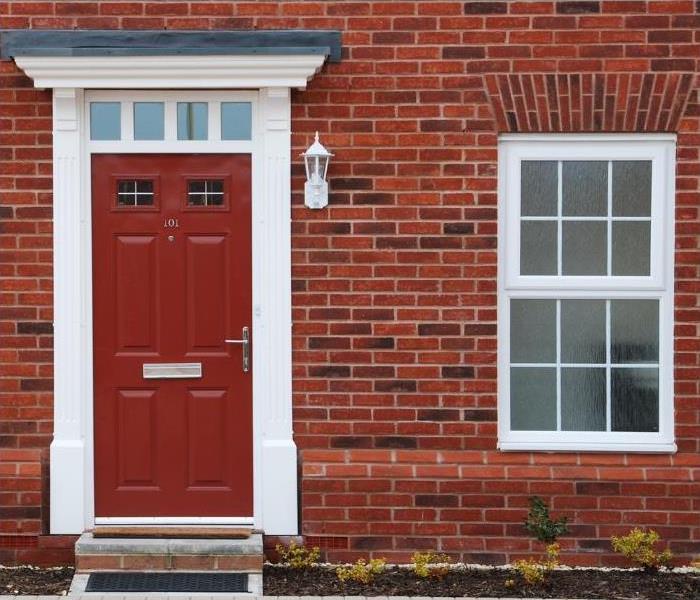 Contact the professionals at SERVPRO if you find water damage in your brick property!
Contact the professionals at SERVPRO if you find water damage in your brick property!
It is essential to understand the causes of water damage behind brick walls before issues worsen.
Water damage can be a big problem for any property owner. Not only does it cause extensive damage that can be costly to repair, but it can also lead to extensive mold growth.
Water damage can happen to commercial properties for countless reasons. In some cases, the professionals at SERVPRO have seen water leaking through the masonry wall of the building. While this is not always easy to detect, there are a few common reasons that water may trickle through the masonry and cause damage.
The professionals at SERVPRO of Downtown Atlanta have one goal for the property owners in Atlanta: to stay water damage-free for many years to come. Therefore, in the following blog post, we will cover three ways water can enter behind a brick wall and cause water damage.
Before we begin, we must mention that if you are certain that there is something wrong with the exterior of your brick property, then you should consider getting professional help from those at SERVPRO. The professionals at SERVPRO know what to look for when inspecting masonry walls and the different types of repairs necessary to fix brick wall leaks.
Signs of brick wall water damage
There are a few signs that you may notice when inspecting your commercial property for water damage, including:
- Puddling around the interior walls
- Mold growth on or around the brick walls
- The interior paint peeling
- Dark spots or streaks coming from behind the wall
- Cracks and delamination
Three ways water enters past masonry walls
The three ways that water can enter a masonry wall are:
- Expansion joints
- Cracks
- Open grout lines
Expansion Joints: Expansion joints are built into brick walls when they are constructed to expand and contract without cracking or compromising the wall's integrity. Water can trickle in and travel behind the wall when these joints become loose and break apart. The water can remain there for a long time before it begins to damage the interior of the building; it is not uncommon for owners to think they have a water leak in their ceiling when the issue is occurring between the brick wall and the roof.
Cracks: Cracks in a brick wall can be caused by many different things, such as movement of the building, changes in temperature, and even age. When these cracks widen and water seeps through, the water will travel behind the wall until reaching an interior opening.
Open Mortar Lines: Water can travel inside the wall when the mortar between the bricks becomes loose or falls out. You should always watch your exterior walls to ensure that all mortar is tight and not crumbling apart. If there are any openings in the mortar, you need to apply new mortar quickly to prevent water damage.
Wrapping up
We hope you enjoyed learning about the causes of water damage behind brick walls. If you have a commercial building or residential property that has been constructed of masonry, then it is important to look for the signs of water leaks. We also want to stress how important it is for property owners to hire professionals from SERVPRO of Downtown Atlanta if they notice any issues with their brick walls.
When it comes to water damage, the professionals at SERVPRO have seen it all. So if you are having issues with water leaking through your brick walls, please do not hesitate to contact us.
SERVPRO of Downtown Atlanta is available 24/7, 365 days a year and are more than happy to inspect the damage and provide you with a restoration estimate for repairs.
3 Great Ways to Prevent Mold In A Boiler Room
11/24/2021 (Permalink)
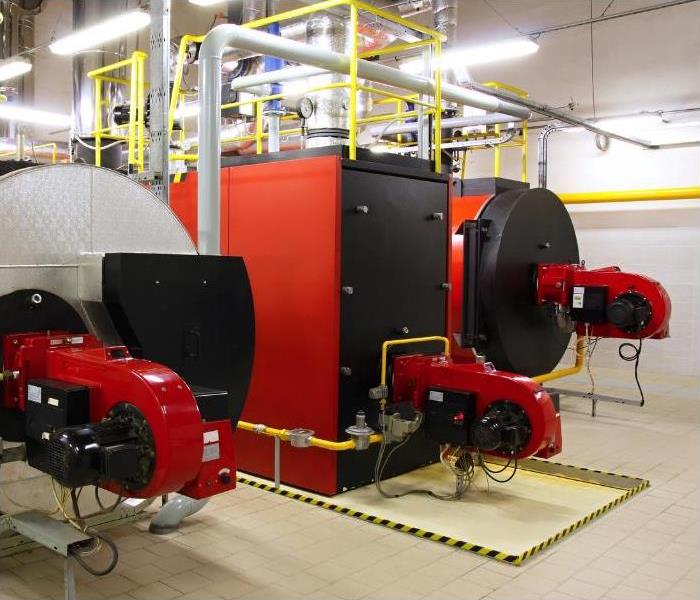 Contact the best commercial mold remediation team in Atlanta for superb services!
Contact the best commercial mold remediation team in Atlanta for superb services!
The professionals at SERVPRO of Downtown Atlanta receive multiple calls a year regarding mold damage inside boiler rooms.
Mold needs three things to grow-moisture, heat, and organic matter. A boiler room might have all three of these in abundance; that's why it's essential to look out for any signs of mold in this area.
Our professionals at SERVPRO are highly trained to spot and clean up mold damage but would rather save you time and money by preventing mold from growing in the first place. Therefore, to avoid mold growth in a boiler room, we have created the following blog post that includes excellent tips on preventing mold growth in a boiler room.
What is mold?
Mold is a fungus. There are thousands of different types, but they all create the same effect-they destroy organic matter through decomposition. Mold is easy to spot when you have visible black spots or an odd color growing in your home or office, but mold can also be invisible.
Excess mold growth inside a home or business is cause for concern. If left unaddressed, mold can destroy the appliances in your property or even damage the structure itself. Therefore, it is essential to spot mold early and remove it as soon as possible.
What causes mold in a boiler room?
Before we get into the prevention measures, let's first discuss what causes mold in boiler rooms. The professionals at SERVPRO have found that the number one cause of mold growth in boiler rooms comes after water damage. Water damage in a boiler room can be from a malfunctioning boiler system.
Signs of mold growth are commonly visible at first glance in a boiler room. One will notice black or blue-green spots on walls, ceilings, floors, and other hard surfaces. However, not all types of mold are visible to the human eye. There are cases where bacterial growth is so severe that it is visible but still difficult to detect with eyesight alone. This makes it extremely important to use any means necessary to detect mold before it spreads throughout other parts of the property.
The three ways to prevent boiler room mold
1) Ensure the area is well ventilated
Mold thrives when there is poor air circulation, so to prevent mold growth, there must be adequate ventilation in your boiler room. You should plan to have your boilers serviced at least once a year by a professional so they can ensure proper ventilation is maintained at all times.
2) Check for leaks
One of the easiest ways to prevent mold growth is to fix any boiler leaks. The professionals at SERVPRO have come across several mold cases caused by boiler leaks. Fixing any boiler leaks will ensure that the area isn't overly moist.
Mold growth can happen within 48 hours after any excess water has sat inside a boiler room, so do not wait to fix any leaks.
3) Install a dehumidifier
The final way one can prevent mold is by installing a dehumidifier to dry out any excess moisture lingering in the air. A dehumidifier will remove any excess moisture and allow for a more optimal humidity level.
We recommend installing an electric refrigeration dehumidifier. An electric refrigeration dehumidifier is portable and will work quickly to remove any excess moisture and help prevent mold growth.
Final thoughts
As we mentioned earlier, mold needs three things to grow-moisture, heat, and organic matter, and unfortunately, it is common for a boiler room to have all three of these in abundance.
Please contact us today if you notice any signs of mold in your boiler room. SERVPRO of Downtown Atlanta is available 24/7 to help protect your business, employees, and customers from the hazards that come with excess mold growth!
Apartment Odor Removal: 3 Awful Odors That Affect Apartments
9/1/2021 (Permalink)
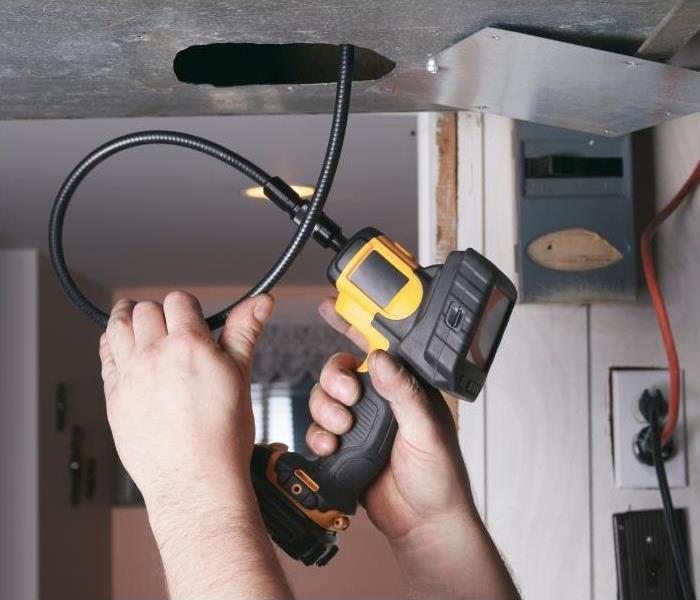 Contact the professionals at SERVPRO when there is an awful smell in your apartment duct system.
Contact the professionals at SERVPRO when there is an awful smell in your apartment duct system.
Odors inside an apartment can be tough to remove without professional help.
Apartment complexes are popping up all over Atlanta, and apartment living is becoming more popular than ever before. Unfortunately, as apartment complexes grow in numbers, so are the chances of odor affecting an apartment complex. Luckily for you, SERVPRO offers apartment odor removal services to help get rid of these unwanted smells!
If you are a property manager who manages an apartment complex, you understand how hard it can be to get away from the smell of cooking and other apartment odors that build up over time. The worst part about apartment odors is that they affect the surrounding apartments!
In this blog post, we will look at the three most common types of odors that we have found to affect an apartment complex and why you should contact us when there is an odor that seems impossible to remove.
3 main types of odors in found in apartments
The professionals at SERVPRO of Downtown Atlanta have built relationships with property managers throughout Atlanta, Georgia. As a result, all of our property managers have chosen us to be their go-to commercial service provider because they know that we perform fast high-quality services.
The majority of the service calls we receive are in regards to fire, water, and mold restoration services. Still, often we also receive calls when a property manager requires apartment odor removal services.
Out of all of the apartment odor removal call that we receive, the following are the three most common:
- Odors from pet urine: Pet urine odors will be easily absorbed in an apartment's carpeting, drapes, and any upholstered furniture. To remove absorbed odors, you will need to clean these items thoroughly. When the odor damage is severe, it may be best to remove the items from the apartment and fully replace them.
- Odors from mold damage: Mold spores have a distinct smell and can travel fast when not properly contained. The best way to avoid the spread of mold odors is to call a mold remediation company that knows the proper way to remediate mold damage.
- Lingering odors left after a fire: After a kitchen fire is extinguished, the smell may have been absorbed into the walls of an apartment as well as other areas that are porous. To remove the lingering smoke odor after a fire has occurred, you should contact smoke damage professionals that specialize in commercial properties because they have the equipment and knowledge to remove any odors left after a fire.
Apartment odors trapped in the ducts
More severe odors are likely to travel into an apartment's duct system and affect multiple other units. The best way to remove odors in a duct system is to hire duct cleaning professionals because they have the equipment and knowledge to remove unwanted odors from the ducts.
A recent apartment odor service call
Earlier last month, the professionals at SERVPRO received a call from a property manager who was in desperate need of odor removal services. The odor was coming from the duct system and had affected multiple units on the third floor of an eight-story apartment complex in Atlanta.
When our fast responders arrived, we noticed that there was something unusual inside the duct system. After further inspection, we found that the apartment odor was coming from a dead animal trapped in the duct system.
Moving forward, we removed the dead animal and wiped down the affected area. Lastly, we applied a SERVPRO approved deodorant to ensure that the nasty odor would stop affecting the surrounding apartments.
You can count on SERVPRO.
When you choose to hire SERVPRO, you can count on apartment odor removal that will be effective and efficient.
As a locally owned business, SERVPRO of Downtown Atlanta is committed to providing the best apartment odor removal in Atlanta, Georgia. Not only do we offer commercial odor removal, but our certified IICRC technicians also have extensive experience removing all types of odors from residential properties.
Please contact us today if you need professional assistance locating and removing any unwanted odors!
How to Handle Water Damage from Sprinkler Systems
6/16/2021 (Permalink)
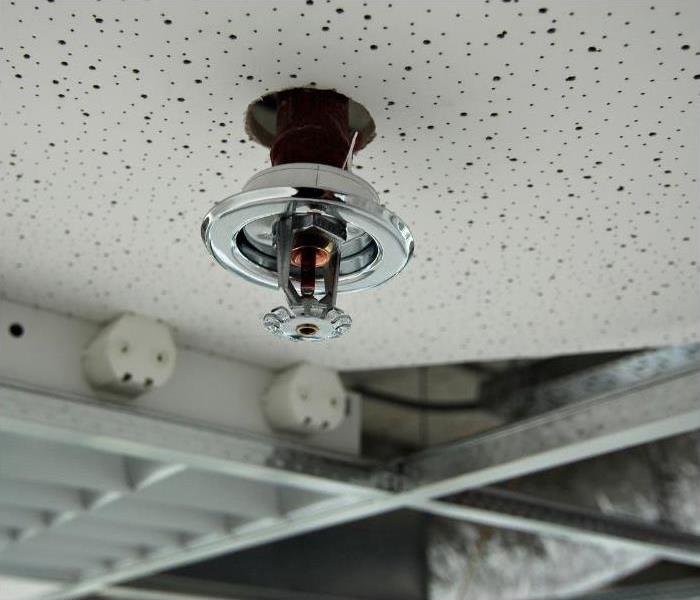 Contact SERVPRO today for commercial water damage restoration!
Contact SERVPRO today for commercial water damage restoration!
Sprinkler system water damage can happen to any commercial property in Atlanta.
Sprinkler systems are designed to protect your property from fire, but they often end up causing commercial water damage instead. In this blog post, we will discuss what types of sprinklers can cause water damage and how these systems work so that you know what to do when water damage from sprinkler systems occurs!
What types of sprinkler systems use water?
Perhaps you recently acquired a new commercial property in Atlanta and are curious what type of sprinkler system to install, or you are curious about your current sprinkler system. There are two main types of sprinkler systems, dry and wet systems. If you are looking to avoid water damage from a sprinkler system, it will be best to install a dry system.
Wet pipe systems are the most common choice but they can cause commercial water damage. Wet pipe systems work by heat activation. When a fire begins, a sprinkler head will release water that is stored in the pipes.
How can water damage from a sprinkler system occur?
The professionals at SERVPRO receive many calls a year regarding water damage from sprinkler systems. We will receive calls when a commercial property has a fire, and the sprinkler system puts the fire out, and for accidental water damages from a sprinkler malfunction.
A common reason when a sprinkler system will accidentally cause water damage is when the system is overheated. Sprinkler systems are designed to put out a fire and when they detect high heat levels. An overheated sprinkler system assumes that the property has a fire and goes off, causing gallons of water damage. A positive attribute of wet pipe systems is that not all sprinkler heads go off at once because each sprinkler head is activated independently. Other common reasons why water damage from sprinkler systems occur are:
- Freezing
- Corrosion
- Poor installation
- Mechanical damage
What to do during sprinkler water damage?
When a commercial property has water damage from a sprinkler system, the property manager or building owner must act quickly by turning off the sprinkler water sources so that further damages do not occur. It will also be an excellent time to turn off the electricity to avoid electrocution and elevator issues from water damage.
After the appropriate valves have been shut off, you need to call a reliable restoration company to come and mitigate the damage.
After you call a water restoration company, call the insurance company that covers damages for the commercial property. The assigned insurance agent may ask for pictures and videos of the damages for their records. It will also be a good time to create a list of all of the damaged items during this time.
The best restoration company for sprinkler system water damage clean up.
In Atlanta, the commercial property owners and property managers have made the team at SERVPRO of Downtown Atlanta their go-to resource regarding all emergency water damage restoration. The IICRC certified professionals at SERVPRO know that they need to act quickly when water damage from a sprinkler system occurs to avoid mold growth.
Contact the professionals at SERVPRO if you are worried about water damage affecting your property. We offer a free service called an Emergency Ready Profile (ERP) to help our commercial property owners quickly mitigate water damage. The ERP will have a plan in place for when water or fire damage does occur.
An ERP will include:
- The location of all emergency shut off valves
- Contact information
- Parking locations
- Emergency exits
- Blueprints
SERVPRO of Downtown Atlanta is available 24/7, hours a day, 365 days a year.
What is A Commercial UV Light Sanitizer System?
5/19/2021 (Permalink)
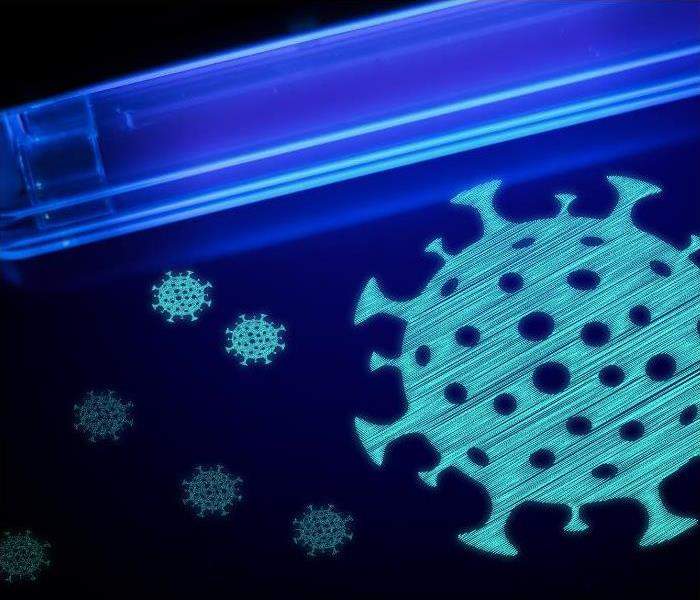 Contact the pathogen cleaning professionals at SERVPRO!
Contact the pathogen cleaning professionals at SERVPRO!
Many commercial properties have recently started using commercial UV light sanitizer systems.
During the coronavirus pandemic, ultraviolet (UV) light disinfection has received a lot of coverage. The essential advantage is its ability to destroy pathogens such as viruses and bacteria.
UV (ultraviolet) light is a form of electromagnetic radiation. It is more energetic than radio waves or electrical light but less vigorous than X-rays or gamma rays. UV light may be emitted by either natural sunlight or human-made sources such as tanning beds.
The most efficient UV light for destroying COVID-19 is to use germicidal UVC light, also known as Ultraviolet Germicidal Radiation (UVGI) technology. While ultraviolet light has newly gained momentum in the national discourse as a result of the pandemic, it's been used in hospitals and water systems for years to kill viruses, bacteria, fungus, spores, as well as other pathogenic microorganisms.
While it's the direct impact on Coronavirus is still being verified, the United States Food and Drug Administration (FDA) says UVC light disinfection has been shown to destroy other types of coronaviruses.
Is a commercial UV light sanitizer worth the investment?
As with any new product, people have many questions about how UV light sanitizers work and whether they are safe before installing them on their property. So we conducted some research to assist you in determining if a commercial UV light sanitizer is worth investing in.
As mentioned, ultraviolet disinfection is the process of killing or destroying harmful microorganisms in a controlled setting. Bacteria and viruses, as well as algae and protozoa, are examples of microorganisms. UV disinfection is used in water and air purification, waste treatment, foodservice protection, and a variety of other disinfection, including sterilization requirements.
Property owners have recently installed commercial UV light sanitation equipment due to its environmentally sustainable operation, rapid action, simple installation, minimal maintenance, and cost-effectiveness.
There are understandable concerns about the efficacy of any new technology, but evidence shows that commercial UV light sanitizers successfully destroy 99 percent of germs in most situations.
When it comes to efficiency, it is critical to choose high-quality items. Any product you install should be checked and engineered to function for beneficial purposes in your commercial property.
4 Key points on UV light sanitation
1) UV light has been used to destroy germs such as bacteria and viruses. You also may have heard of its use in the treatment of SARS-CoV-2, the latest Coronavirus.
2) UV light comes in a variety of forms. UVC light is the most potent form of UV light for destroying germs. It can be used to clean surfaces, the air, and liquids.
3) UVC light destroys germs such as viruses and bacteria by causing damage to molecules such as nucleic acids and proteins. As a result, the germ is unable to carry out the processes required for survival.
4) UVC light is an appealing disinfection choice because it can efficiently inhibit the new Coronavirus without chemicals.
What does the CDC say about UV light sanitation?
The latest research supported by the Centers for Disease Control and Prevention (CDC) supports and improves on previous research supporting the usefulness of an automated UV-C-emitting system to fight pathogens.
The CDC's suggestion for ultraviolet germicidal irradiation is based on the American Society of Heating, Refrigerating, and Air-Conditioning Engineers (ASHRAE) stance on airborne contagious diseases.
ASHRAE recommends two types of ultraviolet germicidal irradiation techniques: installation in air handlers or ventilating ducts and irradiation of occupied spaces' upper air zones with shielding of lower occupied areas. These methods sanitize the air in a room while protecting inhabitants from the damaging effects of ultraviolet radiation.
Where Can UV Light Sanitation Be Used?
UV light sanitation has multiple uses. It is most commonly used in:
- Air Disinfection
- Water Disinfection
- Wastewater Treatment
- Aquarium And Pond
- Laboratory Hygiene
- Food And Beverage Protection
- Light Emitting Diodes (LEDs)
- Water Treatment Systems
SERVPRO Provides Commercial Pathogen Cleaning
We hope you enjoyed learning about commercial UV light sanitation. We have provided this information to you to help keep our Atlanta community safe. Whether or not you choose to install a commercial UV light sanitizer, you should consider hiring a team of properly trained professionals that offers pathogen cleaning for regular maintenance on your property.
As opposed to the traditional house or business cleaning, pathogen cleanup is a service that necessitates industry experience, specialized equipment, and the required certifications. It is essential to get your SERVPRO cleaned certification if you believe that your property has been exposed to a pathogen.
The professionals at SERVPRO of Downtown Atlanta have the experience and skills to sanitize your commercial property quickly so you can get back to functioning order. Contact us today to speak with a commercial cleaning professional.
Atlanta Flat Roof Leak? Here Are 2 Possible Causes
4/28/2021 (Permalink)
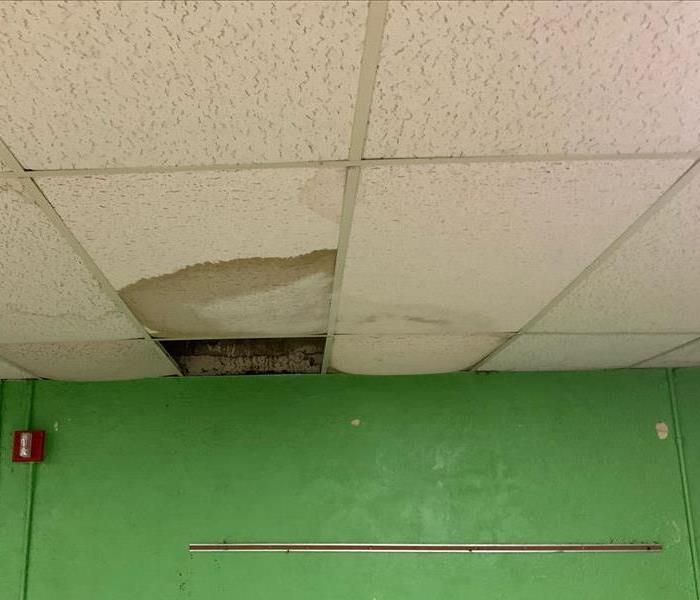 Contact the professionals at SERVPRO for flat roof leak mitigation!
Contact the professionals at SERVPRO for flat roof leak mitigation!
A small flat roof leak can lead to further issues.
Flat roofs are an element of most commercial buildings. They are specifically designed to place HVAC components conveniently. Flat roofs are installed to make commercial roof maintenance a lot easier. However, flat roofs, like all roofing types, are prone to issues as they age. Flat roof leaks are one of the most frequent and inconvenient issues to occur.
There are some advantages of having a flat roof. However, there is one distinct disadvantage to flat roofs: water pooling. It is a known fact that flat roofs do not drain water as much as pitched roofs.
If you own a commercial building with a flat roof and want to learn how to prevent water from pooling on your flat roof or need help with a flat roof leak, keep reading.
A flat roof leak can cause severe commercial water damage.
Pooling is probably the single most serious hazard to a flat roof. Flat roof pooling is any water that stays on the roof for more than 48 hours after it has rained. Pooling water does not pose an imminent danger, but if it is allowed to stand over time, it may cause the roofing membrane to deteriorate. When the flat roofs start to deteriorate, it will likely result in leakage, creating significant commercial water damage issues for the rest of the building's structure.
Prolonged flat roof leaks cause structural damage and wood rot. A damaged roof framing can lead to severe issues down the road that will require the help of a flat roof repair professional.
Signs that a flat roof is leaking
- Interior signs of water damage include discolored stains on the ceiling. These water stains are a sign of water damage that is hard to ignore.
- Water dripping from the roof and seeping into the wall causes bubbling is another example of a flat roof leak.
- Unexplained mold growth in your commercial building, particularly in the attic, is a sign that you're dealing with water damage.
2 Common causes for a flat roof leak
1) Damaged membrane
As time passes, membranes become more vulnerable to damage and pooling. Punctures, splits, blisters, and cracks are all common issues that occur often. When a membrane is breached, water can reach the vulnerable insulation under the membrane. Insidious types of leakage will occur as this insulation gets increasingly waterlogged.
2) Roof penetrating structures can lead to leaks
One common thing between sloped shingle roofs and flat roofs is that they are incredibly vulnerable to leaks anywhere that plumbing pipes, gas lines, or vents rise through a roof's surface. A variety of techniques are used to shield these features from leaks. Installation of pipe boots, rain collars, field wraps, and flashing are a few examples. Despite this, water may still find its way through these barriers and causes flat roof leaks.
How to stop a flat roof from pooling?
Commercial flat roofs aren't necessarily totally flat, although they're named that. Slight slopes in the roof's surface may occur due to faulty construction processes, weak points in the roof, or a concentrated area of debris or precipitation.
Trained Atlanta roofing contractors know how to slope a flat roof for proper drainage. These slopes are designed to help with runoff so that water does not collect on the roof.
- Add more drainage lines to your commercial building.
- Installation of roof crickets.
- Compress insulation.
- Replace the membrane.
- Flush the existing drains.
Check your flat roof for holes
Examine all seams on the flat roof for holes, particularly any places where materials overlap. Keep an eye out for any low spots, especially those that are surrounded by dirt. To quickly find a hole, take a hose up to your roof and spray the place you think is the cause of the water leakage before going inside to see if water trickles from inside the spot where you had first noticed there was a problem.
SERVPRO offers commercial water damage clean up
When a disaster strikes, one can only do just a little without the proper knowledge. It is always wise to have our number readily available to receive help as soon as possible. The faster you get expert assistance, the quicker you'll get rid of the problem.
SERVPRO of Downtown Atlanta is a well-known and reputable restoration company that has been serving customers since 1967. If you want your commercial property to be in a pre-water disaster state within no time, then you should contact SERVPRO.
Contact us today!
How Long To Run a Dehumidifier After a Water Leak?
1/18/2021 (Permalink)
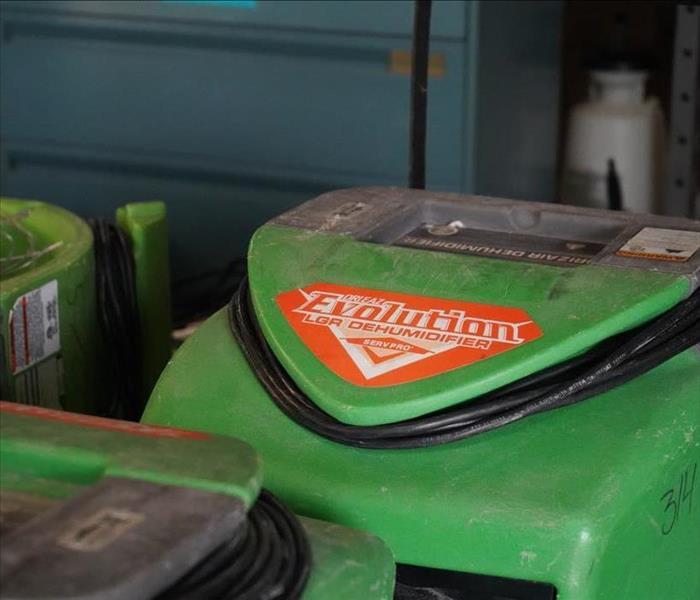 SERVPRO uses advanced drying technology on all jobs.
SERVPRO uses advanced drying technology on all jobs.
Water Damages Require Air Movers and Dehumidifiers
Effective equipment is required for the remediation of water damage. Dehumidifiers and air movers can dry carpets and sub-floors and any hardwood surfaces. They also are useful for drying out water damaged ceilings, upholstery, and walls.
If you have witnessed severe water damage, you understand how challenging it is to restore a property to its original state. The length of water mitigation will be based on the amount of water and its location.
The length you have to operate the dehumidifier relies on various variables, such as the severity of the water leakage and the region subjected to humidity. One known method to shorten the time of dehumidification is by utilizing a closed drying system.
All dehumidifiers collect moist air from the cool coils that condense, absorb, and expel the moisture until the now-dryer air returns to space. When the air in the room gets drier, the droplets will evaporate. Moisture embedded in pillows and other impacted materials can be eliminated.
What Is A Dehumidifier?
A dehumidifier is an electronic appliance that lowers and retains the intensity of humidity in the air, generally for health or convenience purposes.
SERVPRO uses dehumidifiers to quickly dry a wet structure. Our high-quality dehumidifiers can minimize stinky odors and reduce the possibility of mold development by removing moisture from the atmosphere.
Many dehumidifiers arrive with a meter that tests the relative humidity in your home and allows you to adjust the humidity to the amount you like.
Dehumidification Will Stop Mold Growth
If you've got a mold issue in your house, don't delay. Mold will grow as soon as it has a supply of water. When a room's relative humidity rises, the mold will begin to show dark black spots on walls, fabrics, and much more. Dehumidifiers avoid mold growth by lowering the relative humidity in a room.
It is common for rooms that do not have quality ventilation to have mold issues. Common places for mold to develop is inside an attic, crawl spaces, and in the bathroom.
Using a dehumidifier in the common places will help stop the growth of mold. Make sure that you work on finding the cause of the growth. The source of the moisture should not be neglected; neglecting may cause mold growth to occur again in the future.
How Long Will The Water Damage Equipment Stay On-Site?
Unfortunately, it's difficult to tell how long water damage equipment will remain in your home. The time can vary based on the level of water damage, the region's extent, and the kind of dehumidifier.
At SERVPRO, our goal is to have your property dry within five days. The dry time can vary on the size of the water loss, the category, and the number of contents. In some cases, we have had to leave dehumidifiers on-site for prolonged periods due to mold growth. To get your property dried as quickly as possible, we promise to dispatch our heors as soon as we receive your initial call.
When it comes to water damage, it is essential to get in touch with the SERVPRO of Downtown Atlanta water damage repair specialists to help find an appropriate and prompt solution. When our squad arrives, we perform standard water damage repair operations taught by the IICRC. Restoring water damage includes qualified experts who understand how to cope with all possible implications. All of our water damage repair experts are well qualified to handle any size disaster.
What Are Popular Causes of Water Leakage in Buildings
12/23/2020 (Permalink)
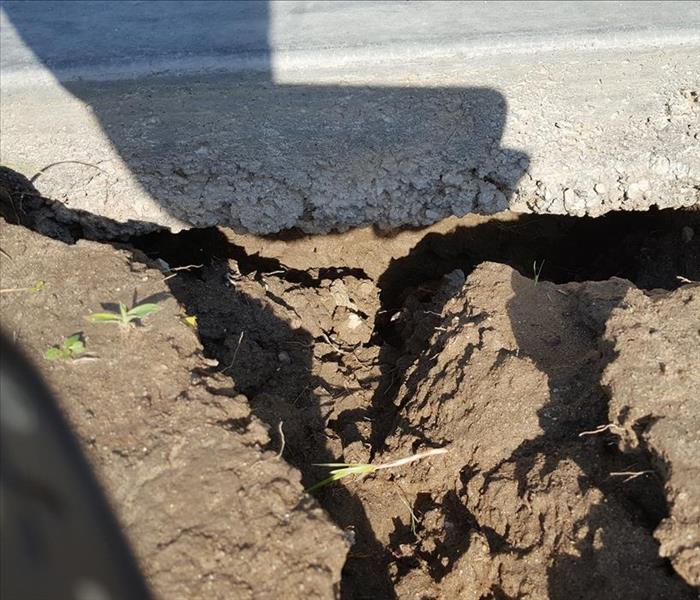 A cracked foundation can cause major water damage
A cracked foundation can cause major water damage
Know what to do to prevent water leakage
Water building leakage or water seepage is among the leading causes of widespread structure faults. The professionals at SERVPRO have seen water penetrate a building by various routes – from damp building materials during the construction process, leaking roofs, water features, and leaking water pipes. If the origin of the water leakage is left unsupervised, it may cause substantial visible damage, often involving very costly structural corrections.
Water leakage can be tough to distinguish the precise cause.
Popular causes for water leakage include:
- Floor seepage from the drain pipes
- Faulty or damaged water-resistance of bathtub coatings
- Leaking in the higher, opposite, or your own flat water source pipes
- Invasion of rainwater
In most situations, water leakage is caused by leakage from faulty water tanks, sanitary fittings, or drainage systems. Typically, these defects can be repaired by certified water damage professionals. Owners should immediately contact a company like SERVPRO to determine the source of the building leakage.
What Can You Do To Prevent Water Damage?
Water damage is among the likely reasons for property damage, but it is not purely seasonal. Use the following measures to ensure that your building remains safe from water damage throughout the year:
- Check carefully for holes and leaks and make the required repairs instantly.
- Inspect the sealing and caulking of all-around showers and bathtubs to ensure they are airtight and sealed properly.
- Annually inspect hoses associated with water heaters, washing machines, and refrigerators.
- If you experience water leaking during the rainy season, it can indicate that your durable cement floor and basement walls have eroded. Hire waterproofing professionals to close sensitive areas to avoid seepage.
- Check the gutters to see if the gutters are drooping. Damaged gutters can cause rainwater to leak in a building.
5 Common Types of Leaks
Knowing the prevalent forms of building leakage will allow you to quickly mitigate and repair small issues before they are likely to cause significant water damage to your property.
Leakage Problem from the Neighbor in Above Flat
Among the most significant concerns that people face is leakage from the flat overhead or above. That is generally caused by leaking pipes or the lack of adequate insulation content in areas like washrooms. Water can seep into the littlest of gaps and cracks, so leaking problems are likely to occur eventually if the structure is not maintained correctly.
In the event of water leakage from the flat above, the tenant of the above flat shall be responsible for carrying out the water damage costs. We have seen condo owners in the above flats claim that water leakage isn't their responsibility and should not be held accountable for it. This type of reasoning is the leading cause of dispute in the event of building leakage problems.
The first course of action is speaking to the apartment owner above and requesting them to address the matter respectfully. Ensure to clarify to them that the dilemma will inevitably impact them, whether now or later. If they still do not comply to get the water damages mitigated, it will be a good idea to get the building owner involved.
Who to Call When You Find Commercial Water Damage
Commercial Water damage presents a considerable risk to commercial facilities, mostly because they use far greater water volumes than residential homes.
If not gotten rid of promptly, excessive water in your home may cause mold damage and cause costly damage to your home's structure and furniture. If the worst happens, get in touch with the SERVPRO, the Commercial Water Damage Repair Specialists, to quickly find an appropriate and prompt solution.
When our squad arrives, we perform increasingly challenging water damage repair operations. Remedying water damage includes qualified experts who understand how to cope with all possible implications. All of our water leakage and damage repair experts are certified by the IICRC.
Call us at (404) 835-0200.
Tips On Cleaning Blood Out Of Carpet And Fabric At A Commercial Property
10/12/2020 (Permalink)
 Trained SERVPRO of South Cobb Professionals clean, disinfect and deodorize the structure.
Trained SERVPRO of South Cobb Professionals clean, disinfect and deodorize the structure.
Disclosure: Before we get started on this post on cleaning blood stains, we want to mention that biohazards can be invisible to the naked eye. It is essential to hire a professional trauma cleaning company to be completely confident that the area is clean and sanitized. SERVPRO utilizes specialized testing equipment and has a blood cleaning machine to ensure proper safety precautions.
A trauma scene or bloody nose can leave a tough carpet stain at your commercial property. Cleaning blood out of carpet as quickly as possible is essential to ensure that no additional health risks occur. If you are going to be cleaning blood stains on your own, it is best to follow these steps that are known to clean blood out of carpet.
What Cleans Blood?
Many different companies are saying that their product is the best cleaner for blood. As a professional bioremediation company, SERVPRO uses specialty enzyme cleaners for cleaning blood out of carpet. An enzymatic cleaner is the best cleaner for blood. Specialty enzyme cleaners for blood will completely biodegrade the stain. When cleaning blood stains, it is essential to wear gloves, even if the blood spill is small.
Blood can seep deep into surfaces and harbor dangerous bloodborne pathogens that traditional cleaning products are unable to remediate. The best cleaner for blood is an enzymatic cleaner because it is capable of cleaning dried blood from carpet and fresh blood spills.
Hepatitis B and C, Methicillin-resistant Staphylococcus aureus (MRSA), and human immunodeficiency virus (HIV) are diseases transmitted through blood stains. When cleaning up blood spills in the workplace, it is better to hire a professional company to be safe rather than doing it yourself.
TIPS on Cleaning Blood Stains:
- The quicker you address the blood stain, the better because cleaning dried blood is a lot more challenging to treat.
- Don't use hot or warm water when cleaning blood stains. Warm water will set the blood stain in.
- When cleaning up blood, use cloth towels. We suggest a white cloth towel for cleaning blood stains because it will be easier to see the blood stain removal. We avoid using colored cloths when cleaning blood stains because a colored cloth can transfer dye to the carpet or upholstery.
- For best practice, it is best to do a spot removal test on a small section of carpet or upholstery to ensure the water or blood cleaning products will not fade or damage your carpet or fabric.
DIY Cleaning Blood Out Of Carpet
- When cleaning blood out of carpet, first brush it with a stiff brush to remove the crusted blood from the surface.
- If you don't want to invest in an enzymatic cleaner for blood removal, you can try to use dish soap.
- Mix one teaspoon of your favorite dish soap with two cups of cold water.
- Use a clean white cloth towel and dip it in the freshly made blood cleaning solution.
- Do not scrub, but blot directly on the blood stain.
- In some cases, the dish soap may not work for cleaning blood out of carpet. If this is the case, then try ammonia.
- In a safe bowl, mix one-half cup of lukewarm water with one tablespoon of ammonia.
- Using a clean white cloth towel, apply the ammonia solution directly onto the blood stain.
- Blot the blood stain until the liquid is fully absorbed.
- Use another cloth towel to dry the wet carpet.
DIY Cleaning Blood Stains From Fabric
- Dampen a white cloth towel with cold water and gently blot the bloodstain. Avoid scrubbing the blood stain. Scrubbing will only push the blood further into the fabric.
- Next, soak a white cloth towel with club soda, and gently blot the stain.
- Repeat the step above to pull the blood stain from the fabric.
- Stop blotting with the cloth when blood is no longer being pulled from the affected surface.
SERVPRO Specializes in Cleaning Blood Stains
More severe blood spills are cleaned up by a professional bioremediation company like SERVPRO. SERVPRO of Downtown Atlanta has only the best highly trained technicians experienced in all the protocols and will use a blood cleaning machine for cleaning blood out of carpet and getting your home or business back to a safe and livable condition. Please remember that cleaning up blood spills in the workplace is not a good idea. Contact us anytime! We are available 24/7 for more information.
Call us at (404) 835-0200.
More about Atlanta.
A Free Emergency Ready Profile Will Help A Commercial Property Manager Prepare For Any Size disaster
7/20/2020 (Permalink)
SERVPRO offers a free Emergency Ready Profile (ERP) for property managers to reference when a water or fire damages occur.
All property managers in Atlanta must always have a list of emergency contacts close by for when any unexpected damages occur to their property.
Developing a SERVPRO Emergency READY Profile for your business will help minimize business interruption by having an immediate action plan. Knowing what to do and what to expect in advance is the key to timely mitigation and can reduce how water and fire damage can affect your business.
5 Benefits of a SERVPRO ERP
1) Emergency Basics
2) Knowing the chain of command
3) On-call Mitigation Specialists
4) Shut off Locations
5) FREE Assessment
1) Emergency Basics
Having an Emergency READY Profile (ERP) prepared before damages will provide all your commercial property staff, the details, and contacts needed to respond efficiently to any situation. A detailed profile will give concise instructions specified to your Atlanta property. When a property experiences flood, fire, mold, or storm damage, the ERP will provide quick access to information needed to start the recovery process.
2) Chain of Command.
All contractors and staff must know the specific person or persons in charge when disaster strikes. Your emergency ready profile allows all to know ahead of time who is in charge, alleviating the confusion when a problem occurs.
3) On-call Mitigation Specialists.
An emergency plan keeps you from having to ADHOC in finding mitigation professionals when disaster strikes. You will have a developed relationship with the SERVPRO Downtown Atlanta team; they will be ready to spring into action when you notify them.
4) Shut off Locations
The uniquely designed plan will provide the facility details such as shut-off valve locations, priority areas, and priority contact information
5) 100% Free Assessment
We offer our emergency plans free of charge. No need to worry about not having the budget for it! We want our Atlanta property managers to know what is going to happen when damages occur.
You go to great lengths to protect your commercial property investment. Our Free ERP, Emergency Ready Profile, is the best way to reduce business interruption following a disaster.
A known statistic in the restoration industry is that as many as 50% of businesses may never recover following a disaster. Of the companies that survive, the overwhelming majority of them had a plan in place.
Having a guide to help you get back into your building following a disaster can help minimize the amount of time your business is inactive by having an immediate plan of action. SERVPRO of Downtown Atlanta wants to provide you with solutions in advance of an emergency to prepare for any size disaster during an emergency. Give us a call today at (404) 835-0200 and set up an appointment for your free ERP!
SERVPRO of Downtown Atlanta is independently owned and operator by IICRC certified Rick Northen. Rick has over twenty years of experience regarding all size disasters. He has picked the best team in Atlanta to service your business.
Sump Pumps Save Commercial Buildings from Atlanta Water Damage
6/15/2020 (Permalink)
We Recommend that our Atlanta commercial property owners check on their sump pumps every six months to prevent severe water damage.
In Atlanta commercial and residential properties, you will find that sump pump drainage systems are a standard technology found in the basement. A sump pump contains water-extracting technology, which includes a small motor so that water can be pumped out. Sump pumps are very beneficial when there is any building that is highly susceptible to flooding.
Commercial Sump pumps
Commercial sump pumps are very different from residential sump pumps because of their size. Commercial buildings need a sump pump that can handle more massive amounts of water damage and possible moisture issues. In some of Atlanta's commercial buildings, we have found sump pumps that contain dual pumps. When flood or water damage occurs in a commercial building, the sump pump takes the water and moves it to a wet well attached to the commercial building.
Two types of commercial sump pumps:
Commercial sump pump drainage systems are sold in two different categories: (Floor Mounted and Guide Rail Submersible Pumps)
What is a Floor-Mounted Sump Pump Drainage System?
Here in Atlanta, our SERVPRO technicians have noticed that floor-mounted sump pumps are the most common in the buildings that we service. We believe that these are the most popular sump pumps because they provide enough power to remove gallons of water and are easy to maintain. A floor-mounted sump pump sits above the basement floor, allowing quick access and easy maintenance.
What is a Guide- Rail submersible Sump pump?
Guide-rail submersible sump pumps are more expensive than floor-mounted sump pumps. The cost difference is because the system is usually hidden in the floor or a wall to save space. Due to the submersible pump being attached to a guide rail, it is easy to raise and lower the pump for maintenance.
Although these are the two types of sump pumps, many brands make and design these types of pumps. (We currently do not have a brand that we recommend, but you can find some of the best options in 2020 here)
We recommend that all of our commercial clients install a sump pump. With a sound sump pump drainage system installed, all concerns of severe water damage can be nullified. Of the two types of pumps, we do not have a preferred version to recommend because we have seen both save thousands of dollars worth of damage.
Sump pumps are critical to have installed in commercial buildings. The installation of a single pump can potentially save an owner thousands of dollars in commercial water damage. We have seen buildings without sump pumps having water damage that was unnoticed for months, causing mold damage. In our previous blogs, we have discussed what mold damage can do if left to grow.
Give us a call at (404) 835-0200 if your commercial property undergoes water damage due to a broken pipe or malfunctioning sump pump. SERVPRO of Downtown Atlanta is a team of restoration professionals that can handle any size disaster. We are here to serve the Atlanta community with integrity backing our name.
Certified: SERVPRO Cleaning in Atlanta
6/1/2020 (Permalink)
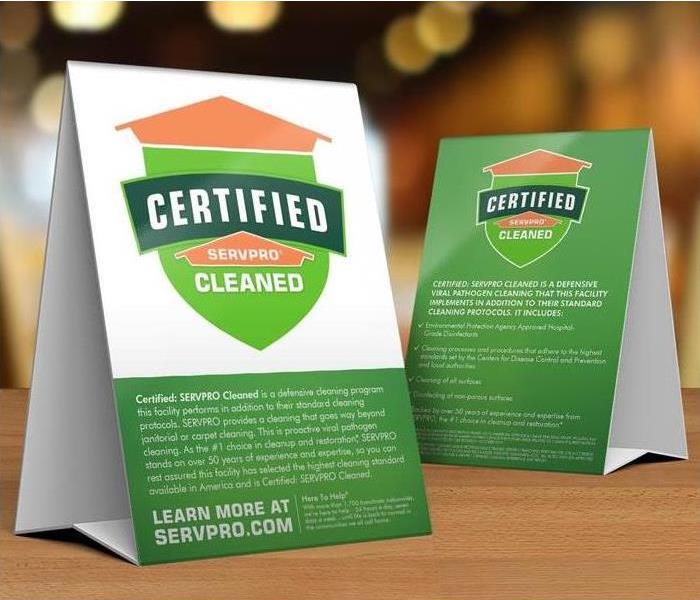 Select a higher standard of clean to help protect your employees and customers.
Select a higher standard of clean to help protect your employees and customers.
Deep Commercial Cleaning in Atlanta
Since the Coronavirus outbreak, we have been steadily busy working with our commercial clients to ensure that their staff is safe to work in a pathogen-free environment. SERVPRO has been in the cleaning industry since 1967. In all the years we have learned some really great ways to ensure that a commercial building in Atlanta is cleaned properly. The CDC is constantly updating the proper cleaning guideline as they are finding out. We want our customers to know that we will continue to stay on top of the latest news regarding Covid19.
Commercial Cleaning Services
We offer a wide array of cleaning services to our Atlanta residents. We pride ourselves on being the go-to company for commercial cleaning as well as restoration. We have all the equipment ready to clean any job large or small.
SERVPRO Commercial Cleaning Services:
- Air Ducts and HVAC
- Biohazard and Sewage
- Trauma and Crime Scene
- Carpet and Upholstery
- Drapes and Blinds
- Ceilings, Walls, and Hard Floors
- Odor Removal and Deodorization
- Vandalism
Covid19 Cleaning
When it comes to cleaning a building specifically for coronavirus and other pathogens we follow our unique 3 C’s:
- Consult: A certified cleaning trained professional knows that not all businesses are the same. A trained professional at SERVPRO Atlanta will come out and take a look and tailor a cleaning program based on the unique needs of your Atlanta facility.
- Clean: Once the person in charge agrees on the plan, an expert deep clean will be initiated using our proprietary EPA-Approved Hospital-Grade cleaning solutions. We are always adhering to the leading level of cleaning and decontamination standards set by the CDC.
- Certify: You’ll know a business is Certified: SERVPRO Cleaned by the shield posted on their front window. Along with digital emblems and other collateral, this beacon represents their commitment to the comfort and security of their employees, customers, and community.
After Commercial Cleaning
Trust us when we say that we care about the commitment and security of your employees, customers, and community. We serve Atlanta and the surrounding cities. We want you to feel comfortable knowing that we live by the saying "we are only as good as our last job."
We Go Above and Beyond
Hiring a professional service means you are getting experience, expertise, and professional cleaning tools that can clean your space to the highest standard. It might catch you off guard on the number of different services that we offer. If you have any questions regarding our Certified: SERVPRO Cleaned program please feel free to call our office at (404) 835-0200.
For more about Atlanta click HERE.
Does the Size of Property Change the Restoration Process?
4/27/2020 (Permalink)
The proper restoration process does not change based on the size of a property. The process can slide on a scale of necessary equipment and workforce but remains the same. For instance, if you had two floors of completely saturated flooring, one plan might be two individuals running each level with as many tools as needed in the assessment. While for homeowners, a restoration company with fewer capabilities could get the work done promptly, we must consider the smaller surface area of possible damage and the amount of equipment needed. However, commercial properties require a reputable restoration company that can handle any size disaster. The best bet for a commercial property in need of any type of restoration, whether its fire, water, mold, or storm damage, is a company that has an ample supply of equipment at hand. The volume of equipment and workforce that SERVPRO of Downtown Atlanta allows for quick response time and quick restore time. Our franchise can have an ample number of IICRC trained technicians, and tools can be at any location in a prompt time. In the past, SERVPRO has helped restore several commercial properties, including:
- Office buildings
- Retail stores
- Strip malls
- Apartment buildings
- Hotels
- Restaurants
Don’t worry about the size of the damage, the tenements or individuals affected by the restoration process, or anything else that might prohibit the smooth running of the business. That will be little to no concern with SERVPRO, who knows efficiency and can create a flexible restoration plan that works around business operations, allowing you to keep running or to be back as quickly as possible.
Atlanta Commercial Mold Damage Needs Remediation
4/27/2020 (Permalink)
Rely on SERVPRO for Mold Cleanup at Your Atlanta Property
To stop and remediate the effects of mold damage in Atlanta, SERVPRO uses the IICRC (Institute of Inspection, Cleaning, and Restoration Certification) Mold Remediation Standard. This is a five-step process that protects occupants and workers, cleans and removes mold, then eliminates the environmental factors that led to the initial infestation.
First, we reduce exposure. Homes with extensive mold growth can cause a limited number of health effects once the growth is disturbed by cleaning and removal procedures. Technicians isolate the affected areas from casual foot traffic by occupants in untouched areas and use the latest in industry-standard equipment to protect themselves.
Second, we document every action. Our remediation team records the initial inspection to include mold growth size, which rooms, hallways, or work areas where it was found, and air content test results of mold spore and moisture levels. These are baselines we use to make sure surfaces are cleaned, and air quality has returned to normal after technicians complete their work.
Third, we control contamination at the source. After the area is isolated, we keep it from spreading as the cleaning procedures get underway. One of our best practices uses negative air machines at the point of drywall and other demolition. These devices draw out dust and particulates from the air; when combined with a HEPA filter, they pull out mold even down to the size of a single spore.
Fourth, we remove the contamination. The particles removed by negative air machines are typically blown outside of your home, but can also be captured and removed to another location. Any debris that has settled onto a surface is then wiped down using a dry cloth. Thicker amounts of contamination require a cleaning agent and a wet cloth. In some cases, a vacuum with a HEPA filter may be used for larger quantities.
Fifth, we reduce the humidity level. As the current infestation is remediated, SERVPRO technicians set up dehumidifiers to lower the moisture content to normal levels, preferably below 60%.
Once technicians have completed work, we test the areas to make sure everything is back to safe levels and then hand you the keys back to your home. Remediation can be an extensive and complicated process, but SERVPRO of Downtown Atlanta is here to help you through it. Call us today at (404) 835-0200 to begin.
SERVPRO Is Here To Help Spot Water Damage Pt 2
4/20/2020 (Permalink)
Here are six simple ways to spot potential water damage in a commercial building:
Pooling/Standing Water
A pool of water can indicate an indoor leak or a burst pipe or several issues related to water damage. If you notice moisture or water collecting in any area that doesn’t go away or gets more extensive, you may have a leak or seepage somewhere. There may also be times you see water pooling in areas of your lawn. If you see this, it may indicate a rise in the level of groundwater usually after heavy rainfall or a burst pipe underground, which could result in significant foundation water damage.
Smell
Areas that have been exposed to moisture for long periods tend to have a very distinct musky, moldy odor. If you notice any spaces in your building or business that have the strange smell of mold or moisture, you may have water damage somewhere not immediately visible. The IICRC trained professionals here at SERVPRO of Downtown Atlanta are trained to clean, sanitize, and deodorize your commercial building after water damage resulting in a lasting odor.
Coldness
Frequently along with the musky smell, areas that are damaged by water are usually noticeably cooler than other areas due to moisture in the walls and other materials evaporating. If there are colder areas around your building or business that are cooler than others, check for some of these other signs of water damage as well to determine if you may have a leak or seepage somewhere.
Discoloration
A very easy to spot indicator of water damage is discoloration of materials like the walls and ceilings of your property. Standing water in a ceiling will eventually seep through the insulation and drywall and leave a yellowish stained spot where the water has collected. Over time these areas can sag if they’re large enough and even collapse if enough water has collected and sat long enough.
Mold
Many sources of moisture can cause mold, and things such as bathroom condensation may cause mold that wouldn’t be extensive enough to require water damage restoration. However, mold in any area of your building is any indicator that there is too much-standing moisture that needs to be removed. Our professional technicians here at SERVPRO of Downtown Atlanta are specially trained in water damage restoration. They can adequately locate and remove all sources of mold in your building or business.
Sound
The final and more subtle sign of water damage to your property is sound. While sounds of moving water, dripping, and creaking may all be sounds of a perfectly normal plumbing system. It is essential to keep an ear out for changes in typical sounds to identify if there are any problems with your plumbing system or if there is a leak somewhere in your building or business.
In the event your building or basement floods, it is best to contact a company of professionals to respond quickly and adequately to help the situation. Give us here at SERVPRO of Downtown Atlanta a call at (404) 835-0200 for any water damage restoration emergency, and we will respond right away.
Can Water Damage in Your Atlanta Apartment Affect Your Neighbors?
3/9/2020 (Permalink)
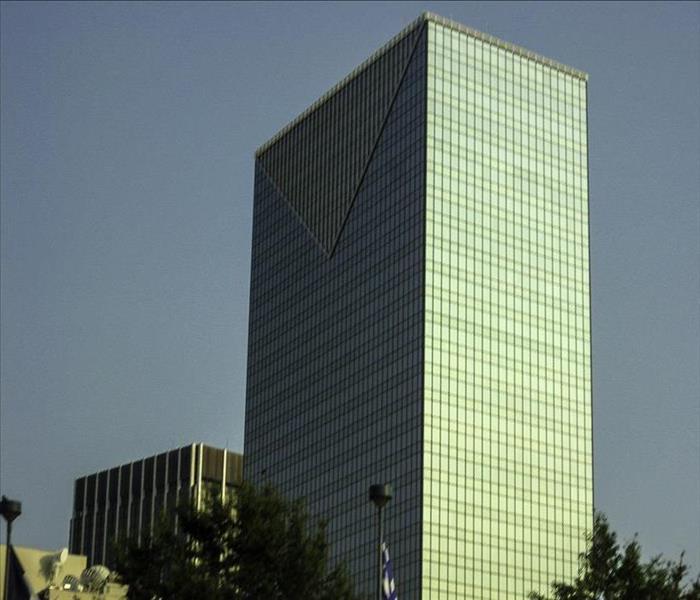 Water damage in your apartment could reach the apartment below or beside you.
Water damage in your apartment could reach the apartment below or beside you.
The benefit may be the same as the drawback for apartments: in a confined place, you're tied to your neighbors.
Apartments are convenient for many reasons, like cost, location, and in-building facilities. One factor that can be a benefit or a drawback is the relationship between neighbors of an apartment building. One apartment's water damage can quickly become water damage for surrounding neighbors.
If you've experienced water damage of any kind in your apartment, for example:
- A burst pipe
- Overflowed toilet
- Cracks in bath causing flooding
- Large spills
- Dysfunctional appliances
It is very possible that the water damage in your apartment could reach the apartment below or beside you. Being that water is heavy in large quantities, can break through any material when built up, and flows through all kinds of materials laterally, this is why it's more than likely that the damage will reach another neighbor. There is no need to feel bad; it's a prevalent issue, and the physical properties of water cause it to spread quickly through floors.
So, as an apartment renter, what can you do?
- Contact Your Property Manager
- Recommend SERVPRO as Your Water Restoration Specialist
- Alert Neighbors to Check for Water Damage
It is the property manager's responsibility to repair the damage for both you and your neighbor. When SERVPRO arrives at the scene, they'll finish the rest of the restoration process, which is a five-step process.
- Contact (This is what you and your property manager did in calling SERVPRO)
- Assessment (SERVPRO reviews the damage and creates a plan)
- Drying (Using their equipment, the drying process begins)
- Salvage (Any water-damaged material that isn't ruined can now be restored)
- Restoration (Ensuring the quality of every damaged material)
The Importance of Promptly Seeking Water Removal Services For Your Atlanta Bookstore
3/12/2018 (Permalink)
 Keep Your Atlanta Bookstore Open for Readers After Water Damage by Calling SERVPRO
Keep Your Atlanta Bookstore Open for Readers After Water Damage by Calling SERVPRO
SERVPRO Moves Quickly to Mitigate Damages Caused by Water and Moisture
Your Atlanta bookstore might be a well-established facility for all of the readers and researchers in your area, but that same foot traffic is what pays the bills and keeps your business in the black. When disaster strikes your building and leaves high volumes of water on the floors throughout your business, professional restoration is one of the best solutions to get your doors open again to that critical customer base more expediently.
When your Atlanta bookstore requires water removal services along with restoration efforts, there is typically quite a lot on the line to getting the issue resolved promptly. No matter which area of your shop takes the brunt of the water damage, there are constant considerations you have to concern yourself with as the owner. The amount of time that your shop has to remain closed for restoration, damage to your books and other stock, time off for employees that count on a paycheck, and also the threat of costly substantial structural damages, all matter.
When our SERVPRO technicians reach your storefront, it is critical for our team to look at the full scope of the damage, as we prepare for the extraction. Removing the water from the area is often a task for a combination of our equipment. With higher volumes of water to extract, the most efficient means of pulling the bulk out of the affected area is through one of the pump trucks in our fleet. Spot extractions follow suit after this, using both portable pumps and wet-vacs for small and inaccessible places.
Drying the area completely is a critical component of our restoration process. Our SERVPRO professionals utilize several different tools for this step as well, based on the severity and size of the dampened areas. For inaccessible areas that commonly remain damp following flooding or excessive water damage, our technicians utilize equipment like our Injectidry system to get inside of walls and dry them out entirely. Moisture reduction is crucial to prevent books from absorbing to dampness or degradation.
When your bookstore falls victim to a water emergency, time is often of the essence. Contact SERVPRO of West Atlanta / Downtown. Our experienced technicians are available 24/7 for any restoration need you might have. Call us today at (404) 835-0200.
Dive into this large thriving downtown metropolis by clicking here.
Commercial Water Removal In Atlanta
1/17/2018 (Permalink)
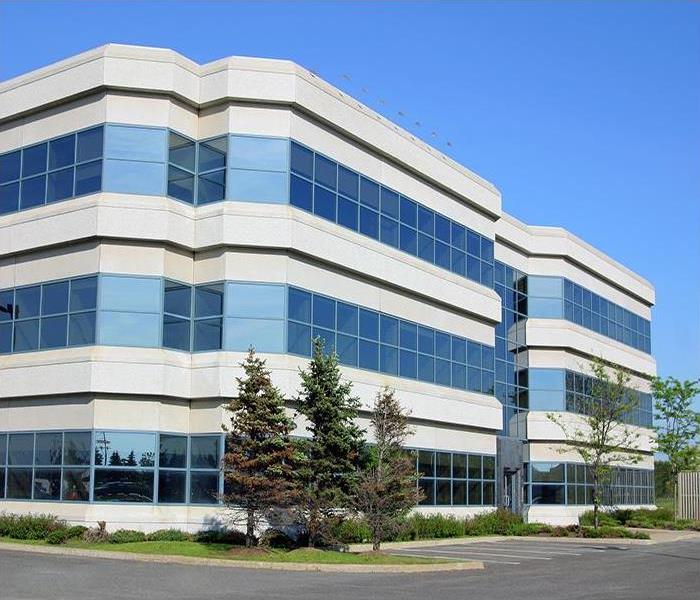 In a smaller business like this, there is a tendency to cut corners when it comes to commercial water removal in Atlanta.
In a smaller business like this, there is a tendency to cut corners when it comes to commercial water removal in Atlanta.
Commercial Water Removal
The weather in Atlanta is OK now, but as most business owners know, most of their flooding and other water issues come from broken toilets or split water lines in the breakroom. Even in an innocuous setting like a dental office all of it should be handled by a professional service.
In a smaller business like this, there is a tendency to cut corners when it comes to commercial water removal in Atlanta. The thought is to spend money on a licensed plumber, but rent a shampoo machine and a water-vac from the nearest big box store to clean up the mess. At SERVPRO, we know from more than twenty years of experience that this is never a good idea.
Even the best rental equipment cannot match the commercial grade machines we bring to each task. We have qualified personnel trained to maintain our equipment on-site and have it ready every time we need it. If we do not have a needed piece of equipment on our shelves, we can get it from another franchise office in our nationwide network.
Take carpets as an example. A water-vac removes most of the water, and they may even feel dry to the touch, but there is always some moisture trapped inside. To thoroughly remove the water and dry them, SERVPRO technicians use pumps, water extraction wands, air movers, and dehumidifiers.
If the water is over two inches, we start with the pumps. Even in a large space with multiple offices, our pumps can finish the job in just a few hours. If it is under two inches, we begin with the extraction wands. Unlike a water-vac, we have multiple settings to adjust the speed and force used. Most of the wands also have a built-in heating element, so we can start to dry the carpets as we finish removing the water trapped inside.
Once we finish with the wands, there is still a small amount of moisture trapped between the carpet layers. Most commercial carpets are glued down, so we use air movers to send war, dry air over the surface. Without the right training to watch the temperature, these devices can soften the glue and cause the carpet to form bubbles. If the air movers are not even an option, we use dehumidifiers exclusively to draw moisture from the carpet and surrounding air to dry them.
Each type of business and building has its special requirements to remove water and reopen the doors to customers. If you need us, call SERVPRO of West Atlanta / Downtown at (404) 835-0200. We are here for you.
Visit https://www.atlantaga.gov/ for more about the city of Atlanta.




 24/7 Emergency Service
24/7 Emergency Service


















